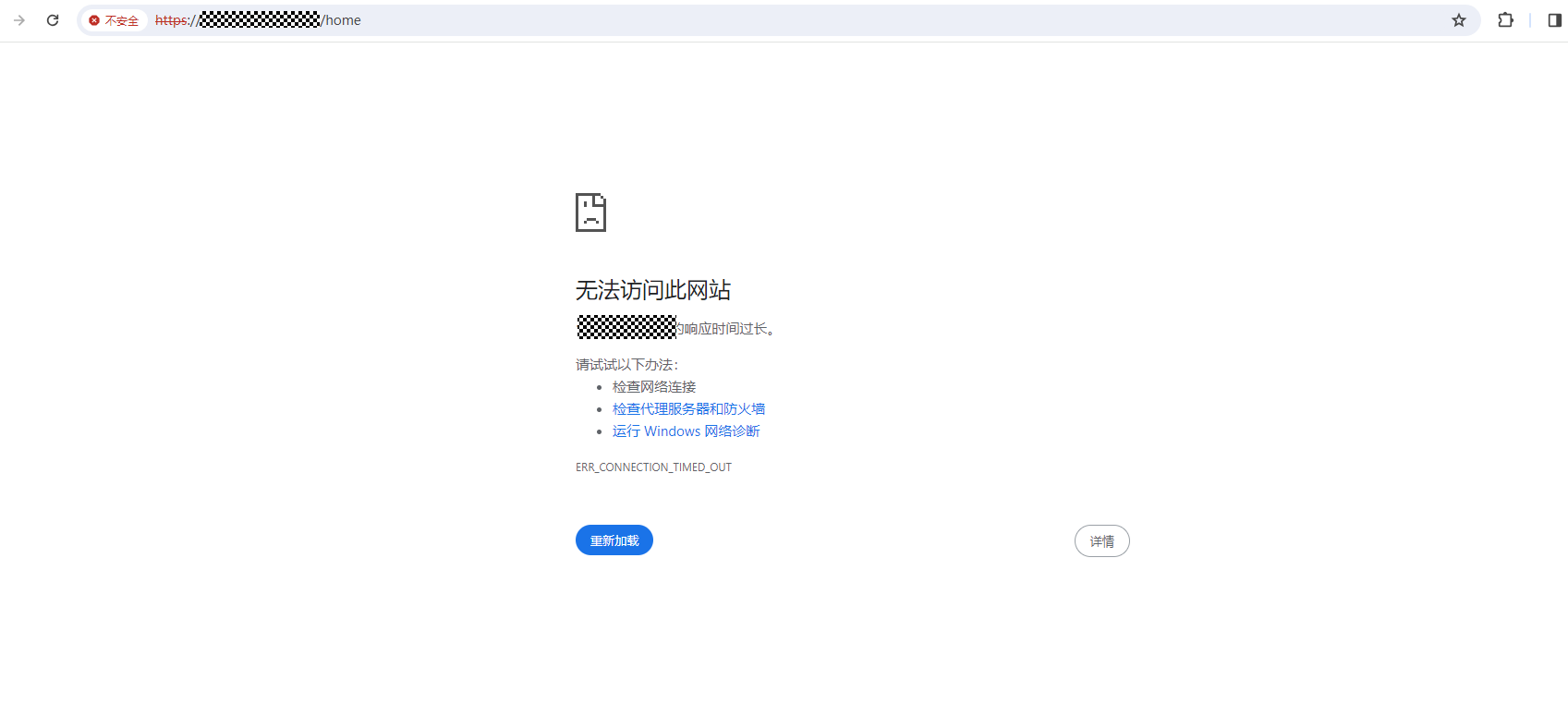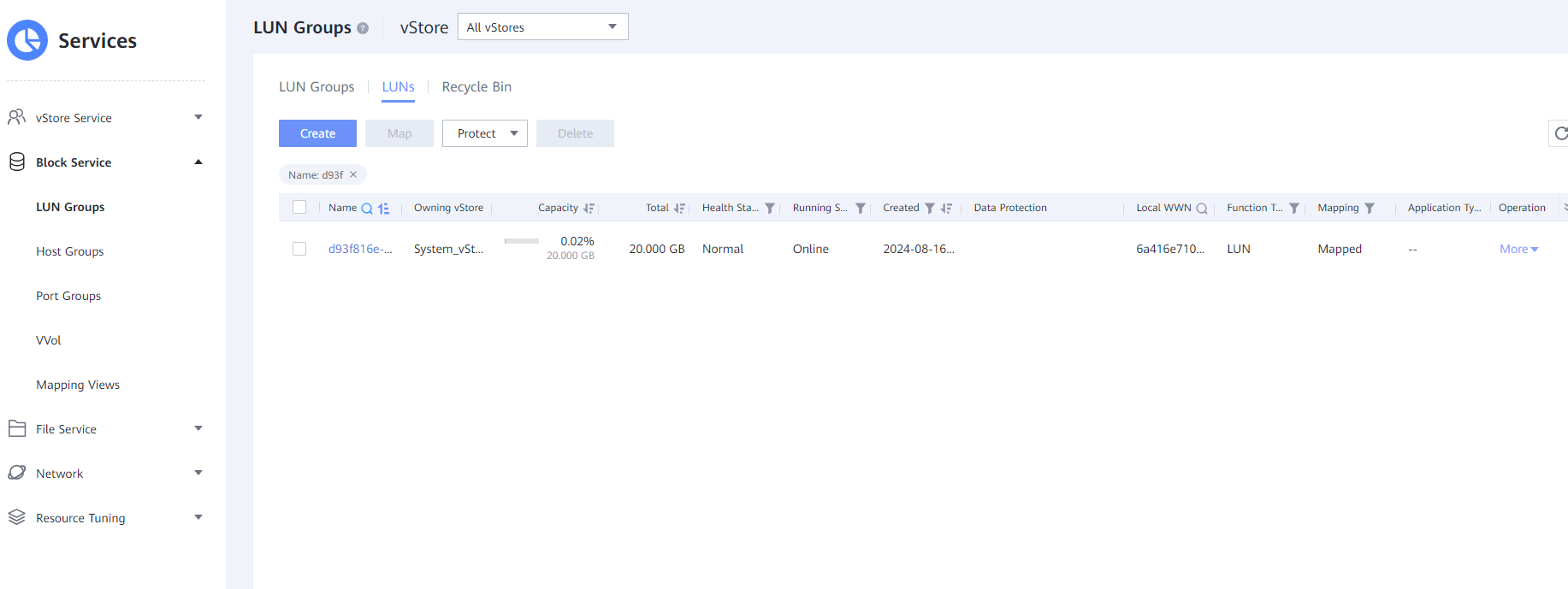Huawei OceanStor Dorado All-Flash Storage and Red Hat OpenStack
Interoperability Test Report
![]()
Axians Global All Rights Reserved
Executive Summary
Axians Global (“Axians”) assessed the interoperability of Red Hat OpenStack with Huawei OceanStor Dorado All-Flash Storage solution. The goal of the assessment is to validate that Red Hat OpenStack is interoperable with Huawei OceanStor Dorado All-Flash Storage.
In the assessment, Axians has determined that Red Hat OpenStack will function with Huawei OceanStor Dorado All-Flash Storage for the following scenarios:
Test Scenario | Storage Involved | Protocol(s) Tested | Result |
Basic Function Test | OceanStor Dorado All-Flash Storage | iSCSI | Passed |
In this document, you will find details on the above test cases and the captured output. The procedures conducted in the tests are referenced from standard online documentation from Red Hat OpenStack and Huawei.
1. Environment Configuration
1.1 Networking diagram
Figure 1.1 Huawei OceanStor Dorado Storage Function Compatibility Test Networking 1
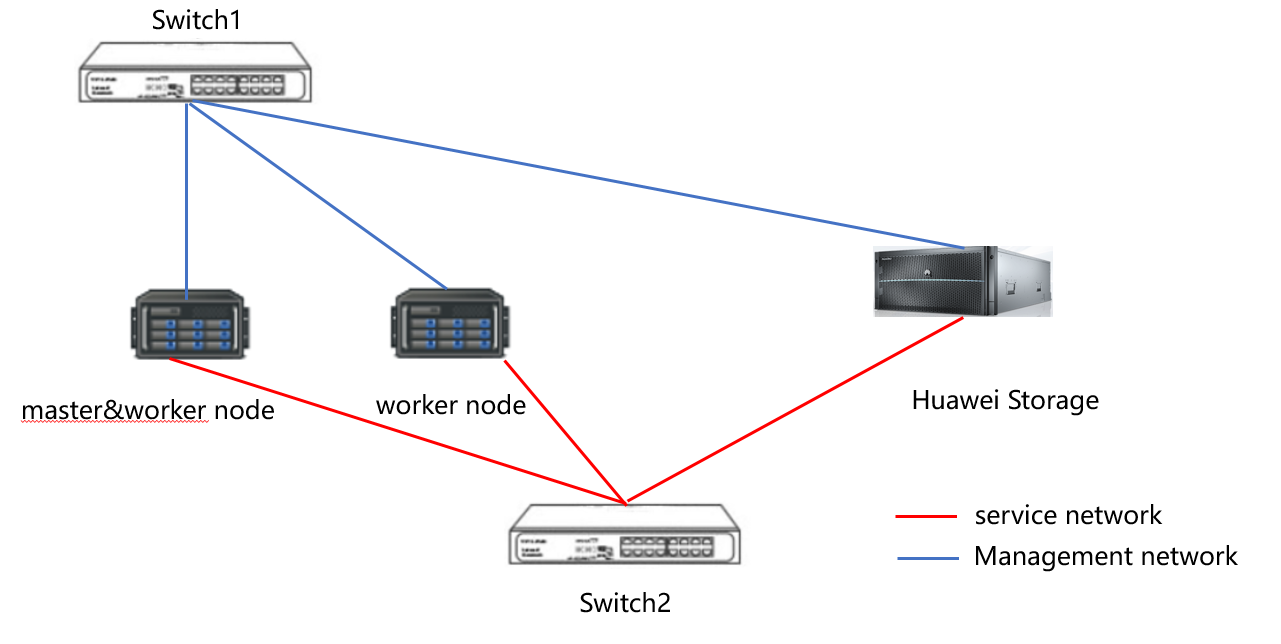
Networking description:
- Deploy one ESXi physical host, install the VMware VM software, create a VM for deploy the OpenStack nodes.
- Deploy the Red Hat OpenStack: Use the Linux VM servers as the OpenStack nodes.
- The management network and service network are connected to the OpenStack nodes and Huawei storage through switches.
- Management network and service network of all storage devices connect to the OpenStack nodes through 10g Ethernet.
1.2 Hardware and Software Configuration
1.2.1 Storage Configuration
Table 1-1 Huawei storage configuration table
Name | Model | Version | Quantity |
Storage | Huawei OceanStor Dorado All-Flash Storage (Hereinafter referred to as “Dorado” as well) | V6 | 1 |
1.2.2 Matching Hardware Configuration
Table 1-2 Hardware Configuration
Name | description | Usage | Quantity |
|
| Deploy the VM for OpenStack nodes. | 1 |
Ethernet switch | Huawei 6855 10GE Network Switch | Ethernet switches for service and management networking. | 1 |
1.2.3 Test Software and Tools
Table 1-3 Test Software and Tool List
Software Name | description | Version | Quantity |
VMware ESXi | VMware virtualization platform | 7.0.U2 | 1 |
Red Hat OpenStack | An open source cloud platform management project | 16.2 | 1 |
| A plug-in deployed on the OpenStack Manila module | 4.3.0 | 1 |
2. OceanStor Dorado Storage Interconnection with Red Hat OpenStack
2.1 Configuring the Multipathing Software
Test Purpose | To verify that OpenStack supports configuring the multipathing software. |
Test Networking | Huawei OceanStor Dorado Storage Function Compatibility Test Networking 1 |
Prerequisites | The OpenStack environment is correctly configured. The Cinder interface is correctly configured. The device networking is normal. |
Test Procedure | Configure the connection to the storage system in various networking modes. Enable the multipathing function on the host. Configure /etc/multipath.conf. Restart the multipathing service. |
Expected Result | In step 2, the multipath service is enabled successfully. In step 4, multipath takes effect after restart. |
Test Results | 1. Configure the connection to the storage system in various networking modes. 2. Enable the multipathing function on the host. |
Test Conclusion | Passed |
2.2 Create Volume
Test Purpose | To verify that OpenStack supports create volume. |
Test Networking | Huawei OceanStor Dorado Storage Function Compatibility Test Networking 1 |
Prerequisites | The OpenStack environment is correctly configured. The Cinder interface is correctly configured. The device networking is normal. |
Test Procedure | Configure volume attributes on Cinder. Create a volume. Check whether the volume information is correct on the disk array. Create multiple LUNs and check whether they are created correctly. |
Expected Result | In steps 2 and 4, the volume is successfully created. In steps 3 and 4, the volume information is correct. |
Test Results | 1. Configure volume attributes on Cinder.  2. Create a volume. 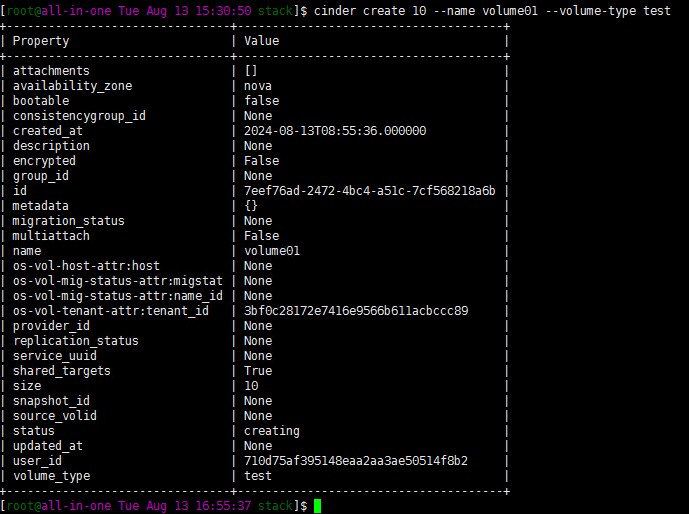 3.Check whether the volume information is correct on the disk array. 3.Check whether the volume information is correct on the disk array.  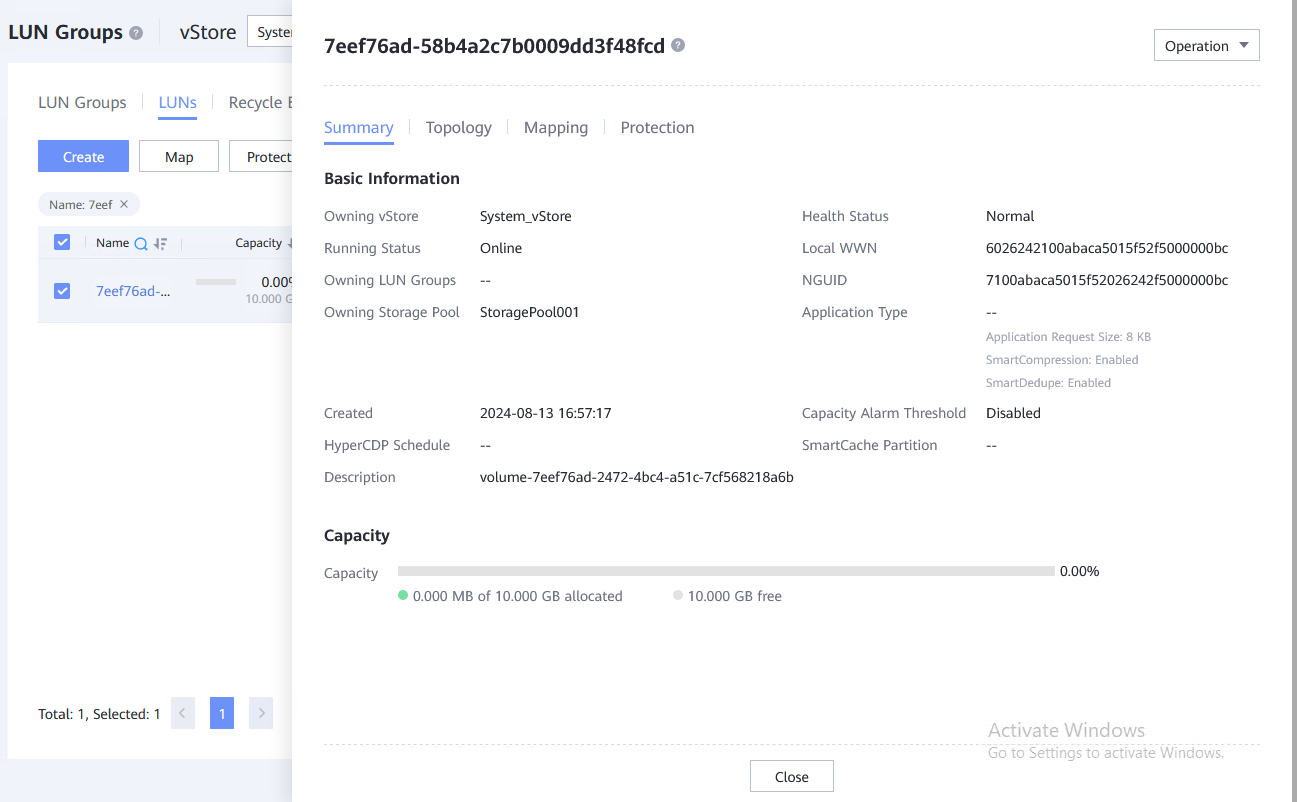 4. Create multiple LUNs and check whether they are created correctly. 4. Create multiple LUNs and check whether they are created correctly. 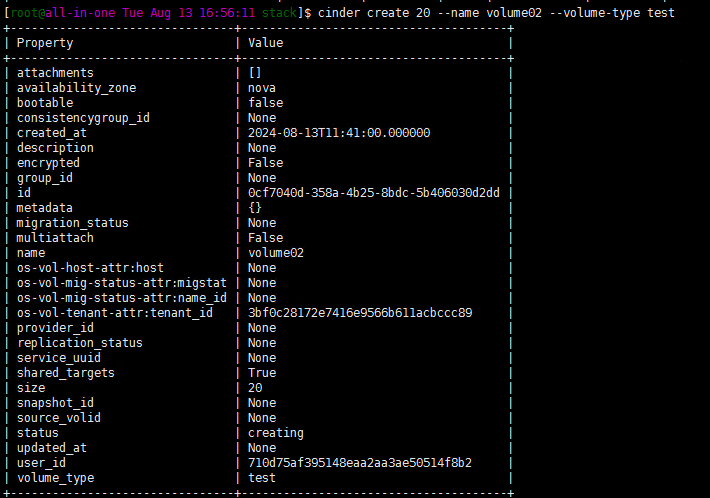
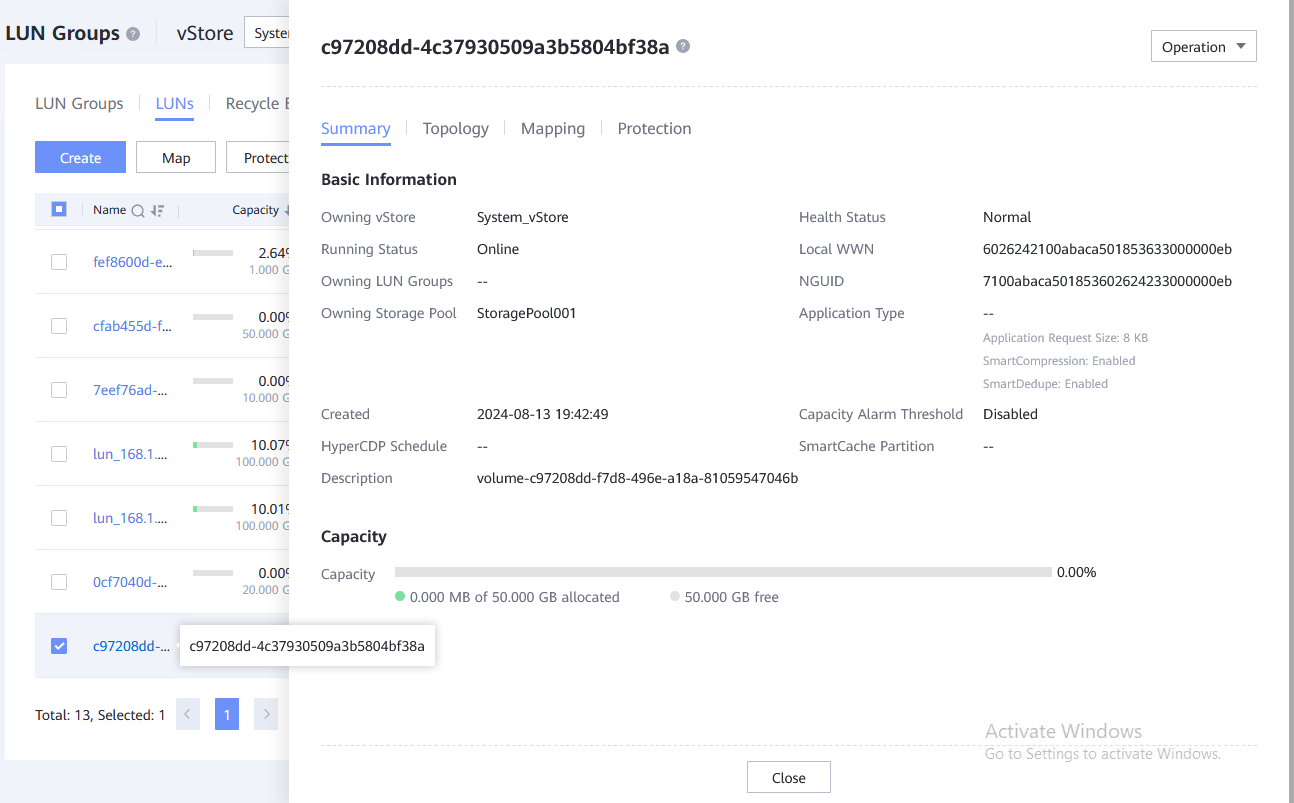 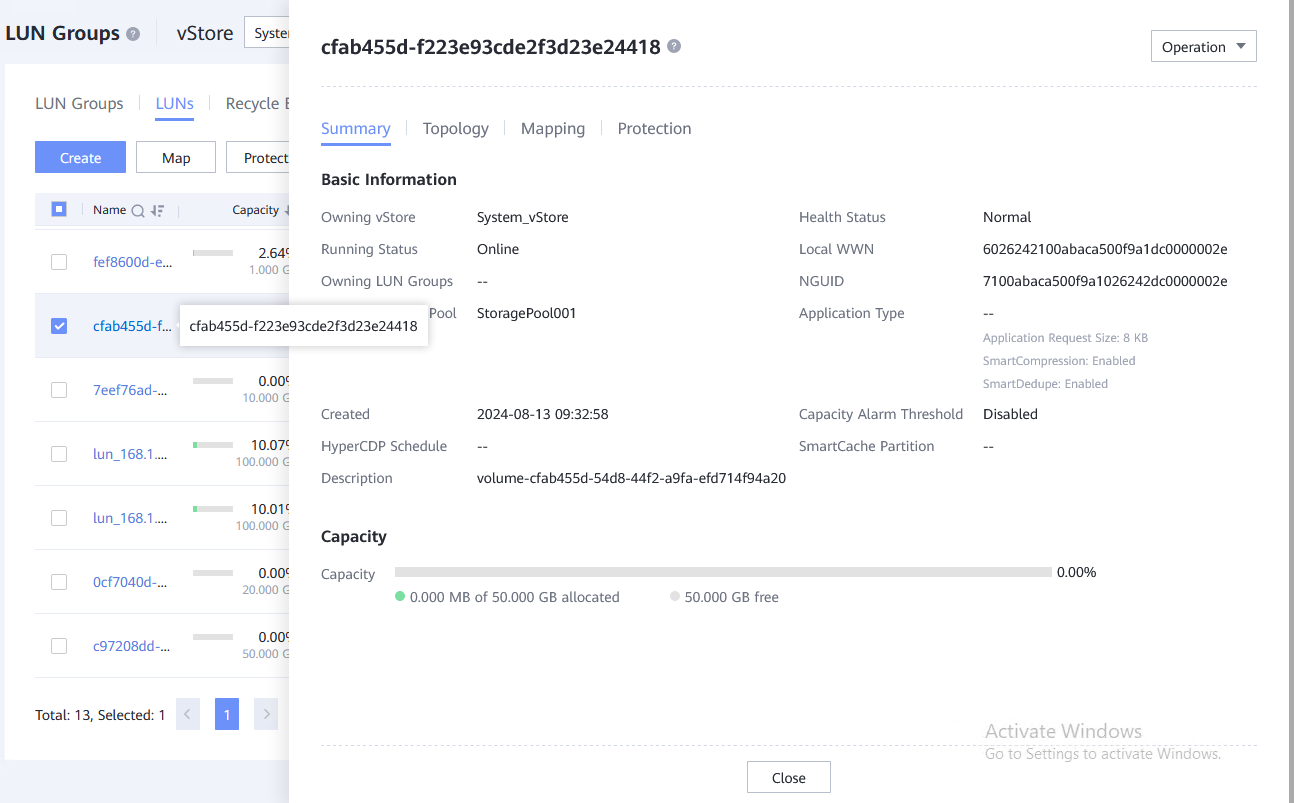 |
Test Conclusion | Passed |
2.3 Delete Volume
Test Purpose | To verify that OpenStack supports delete volume. |
Test Networking | Huawei OceanStor Dorado Storage Function Compatibility Test Networking 1 |
Prerequisites | The OpenStack environment is correctly configured. The Cinder interface is correctly configured. The device networking is normal. A volume has been created on the OpenStack web client. |
Test Procedure | On the OpenStack page, delete the created volume. Log in to the DeviceManager to view LUN information. On the OpenStack page, delete multiple volumes at a time. Log in to the DeviceManager to view LUN information. |
Expected Result | In steps 1 and 3, the deletion operation is successful, and the information recorded in the Cinder log is consistent with the actual situation. In steps 2 and 4, the LUN is successfully deleted. |
Test Results | 1. On the OpenStack page, delete the created volume. 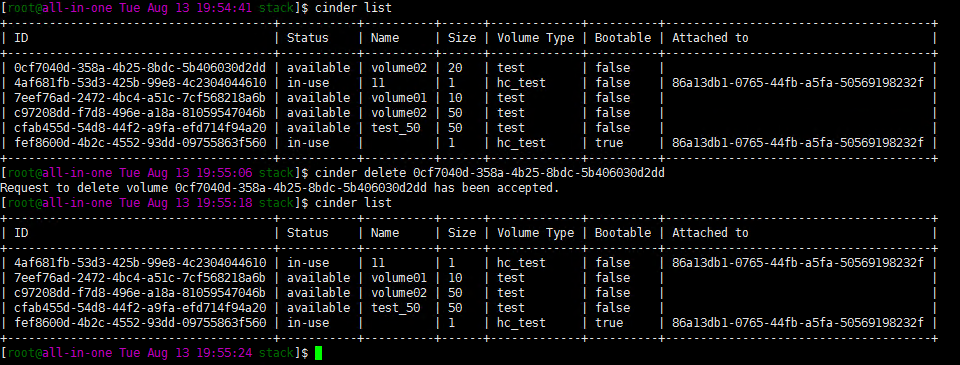 2. Log in to the DeviceManager to view LUN information. 2. Log in to the DeviceManager to view LUN information. 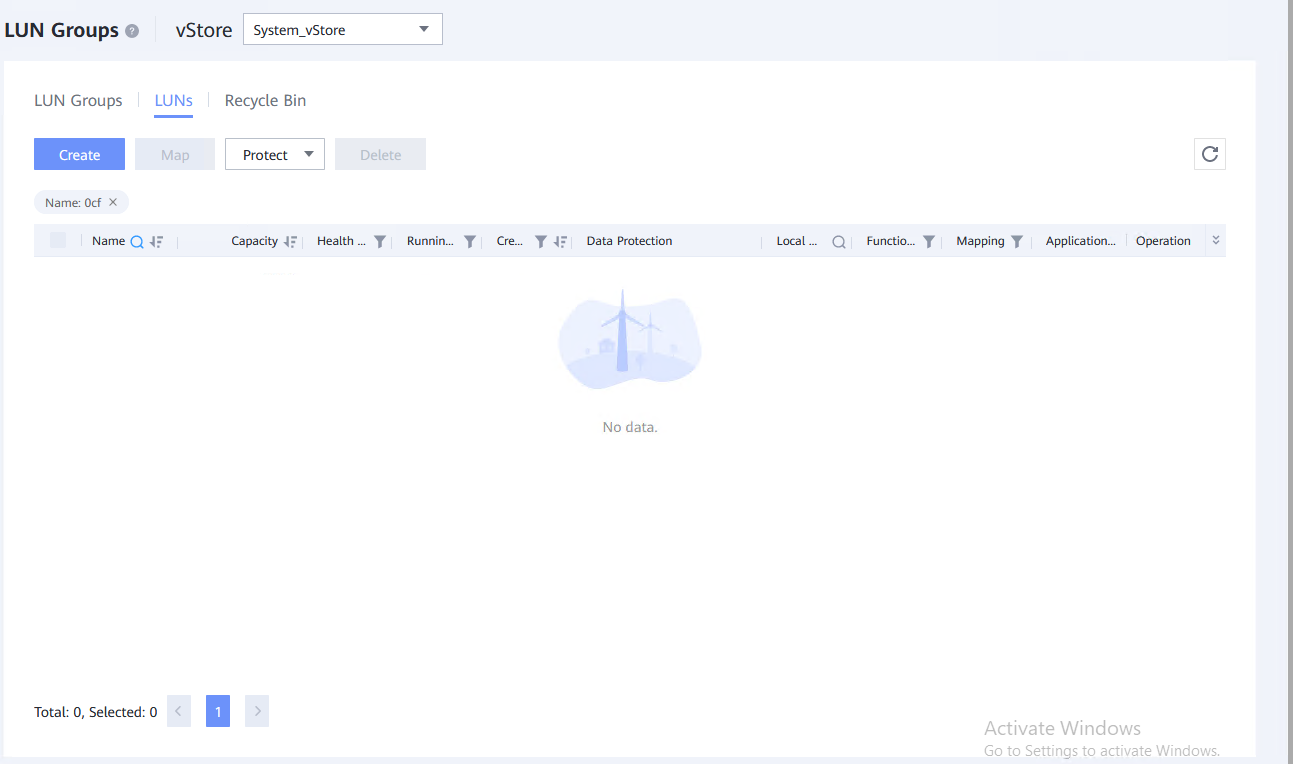 3. On the OpenStack page, delete multiple volumes at a time. 3. On the OpenStack page, delete multiple volumes at a time. 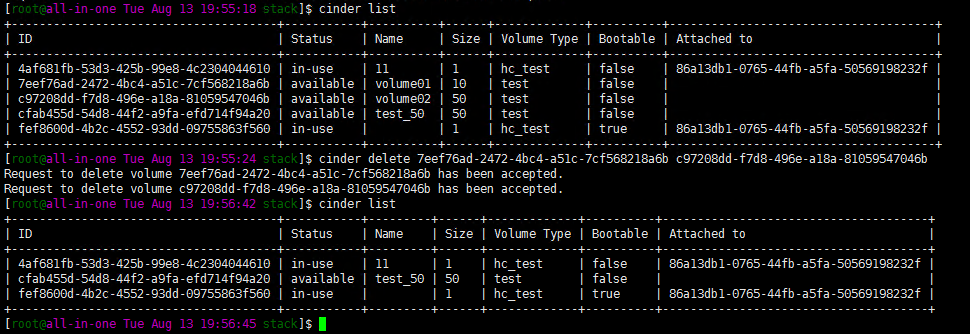 4. Log in to the DeviceManager to view LUN information. 4. Log in to the DeviceManager to view LUN information.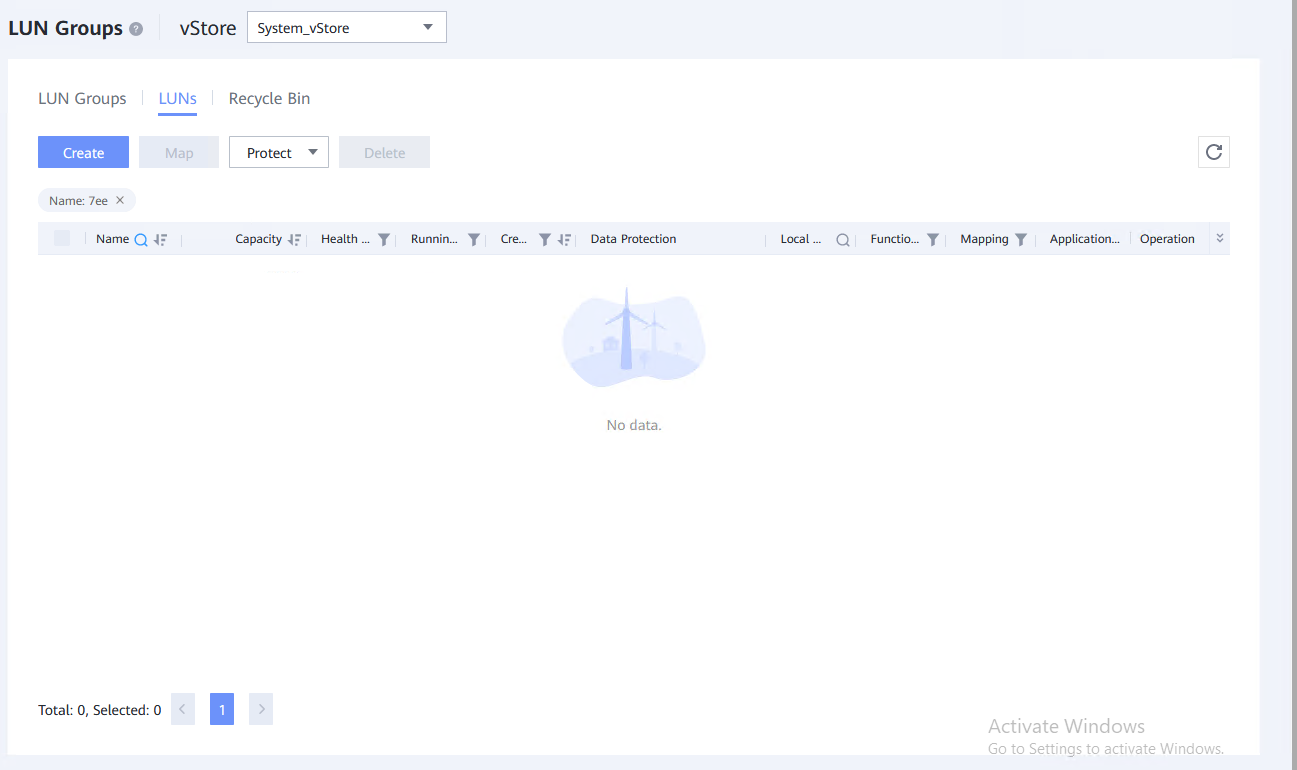
|
Test Conclusion | Passed |
2.4 Additional Volumes
Test Purpose | To verify that OpenStack allows additional volumes. |
Test Networking | Huawei OceanStor Dorado Storage Function Compatibility Test Networking 1 |
Prerequisites | The OpenStack environment is correctly configured. The Cinder interface is correctly configured. The device networking is normal. |
Test Procedure | Create an instance whose system disk is a volume on the storage device. Log in to the OpenStack web client and create volume A. Attach the volume A to the instance. Create a file system for volume A and use dd to read and write the file system. Create volume B and attach volume B to the instance. Check the I/O status. Check whether the volume mapping is normal on the disk array. |
Expected Result | In steps 3 and 5, the volume is attached successfully. In step 6, I/Os do not drop to zero. In step 7, the volume mapping is normal. |
Test Results | 1. Create an instance whose system disk is a volume on the storage device. 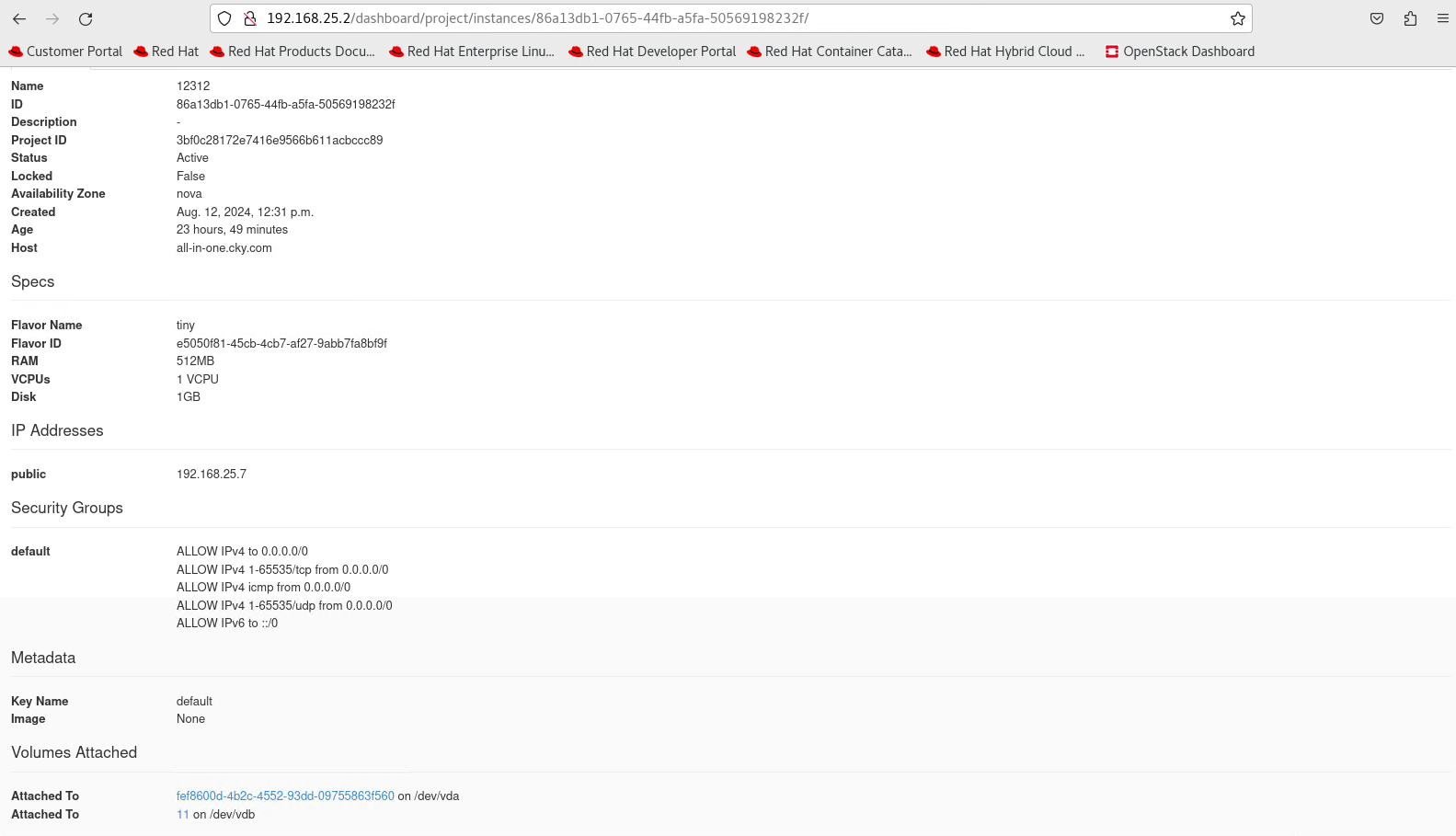 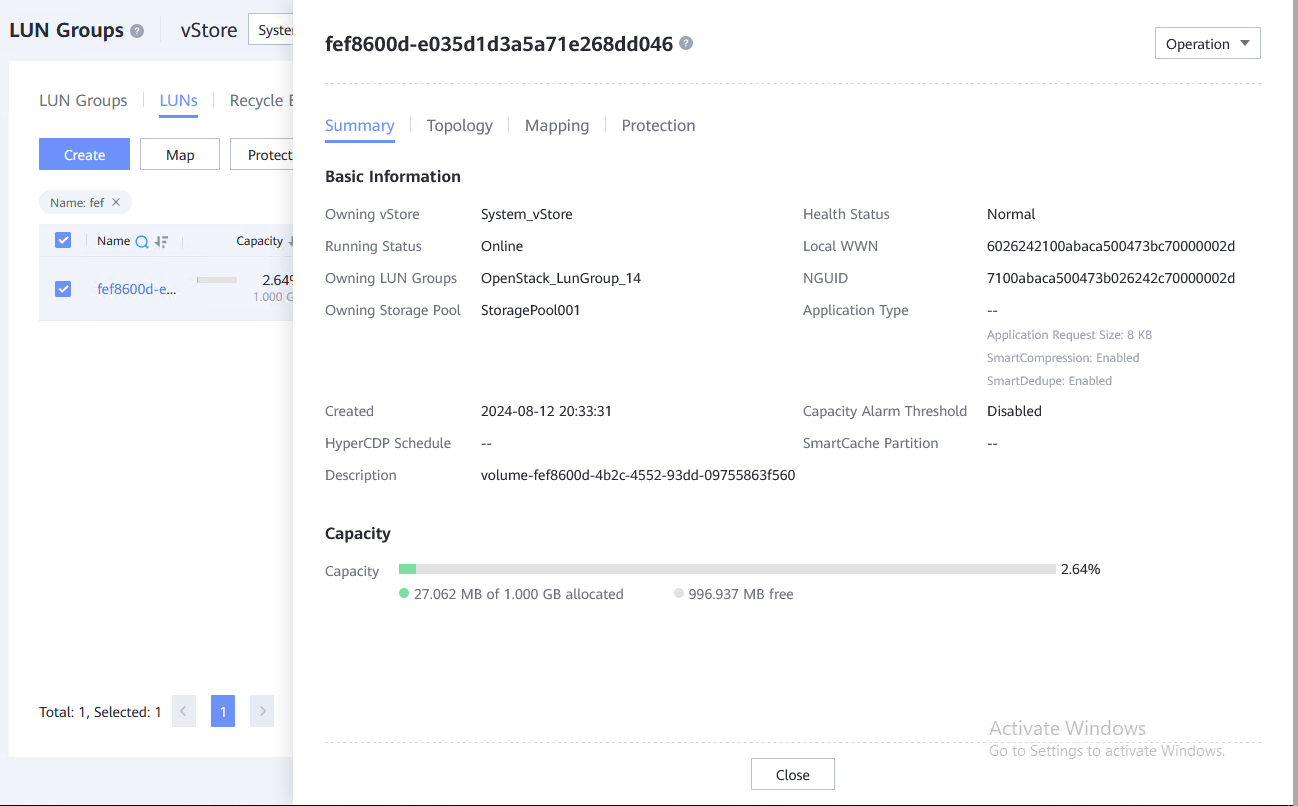 2. Log in to the OpenStack web client and create volume A. 2. Log in to the OpenStack web client and create volume A. 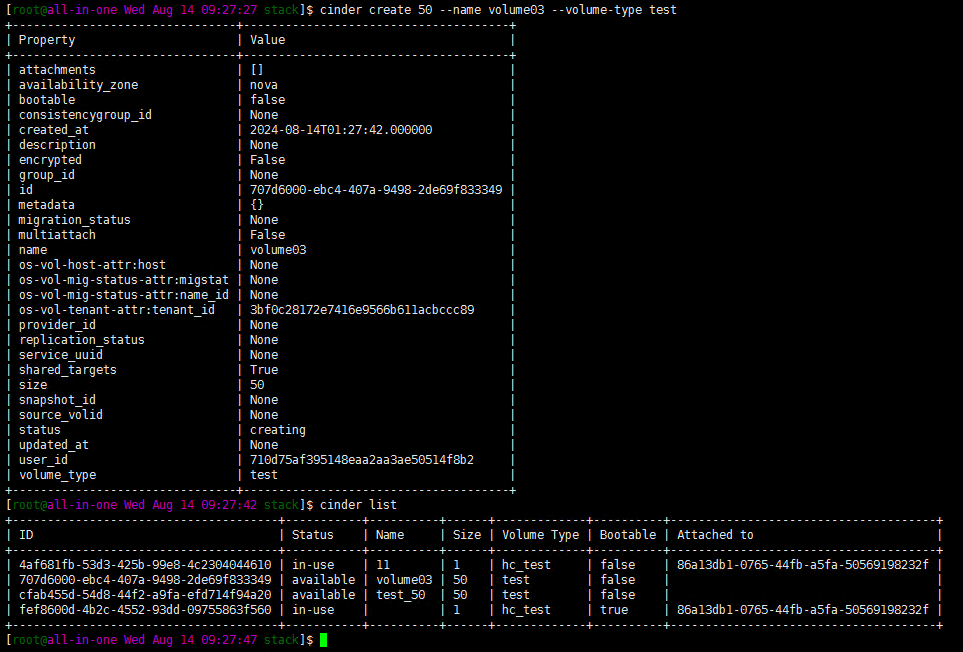 3. Attach the volume A to the instance. 3. Attach the volume A to the instance.  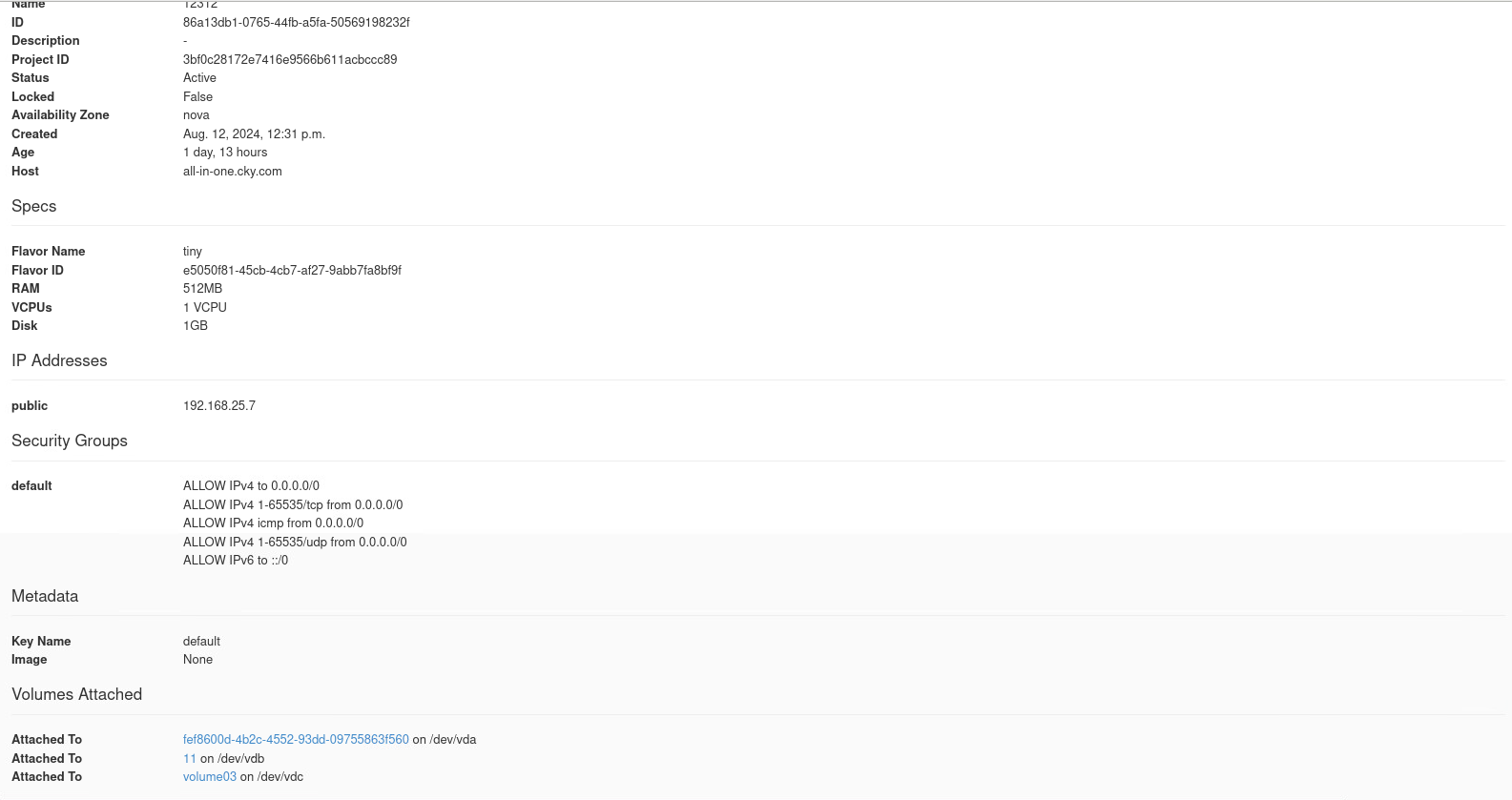 4. Create a file system for volume A and use dd to read and write the file system. 4. Create a file system for volume A and use dd to read and write the file system. 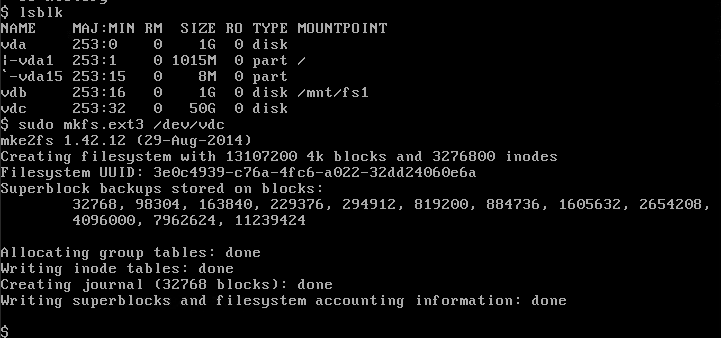  5. Create volume B and attach volume B to the instance.
|
Test Conclusion | Passed |
2.5 Remove Attached Volumes
Test Purpose | To verify that OpenStack allows remove attached volumes. |
Test Networking | Huawei OceanStor Dorado Storage Function Compatibility Test Networking 1 |
Prerequisites | The OpenStack environment is correctly configured. The Cinder interface is correctly configured. The device networking is normal. A LUN has been mapped to the host. Instance has multiple volumes attached on the OpenStack web client. |
| Unattach a volume from an instance. Log in to the VM to view the information about the attached volume and read and write the volume that is not removed. Detach all volumes attached to an instance. Check whether the volume mapping is normal on the array. |
Expected Result | In steps 1 and 3, the alarm is cleared successfully.. In step 4, the mapping relationship is normal. |
Test Results | 1. Unattach a volume from an instance.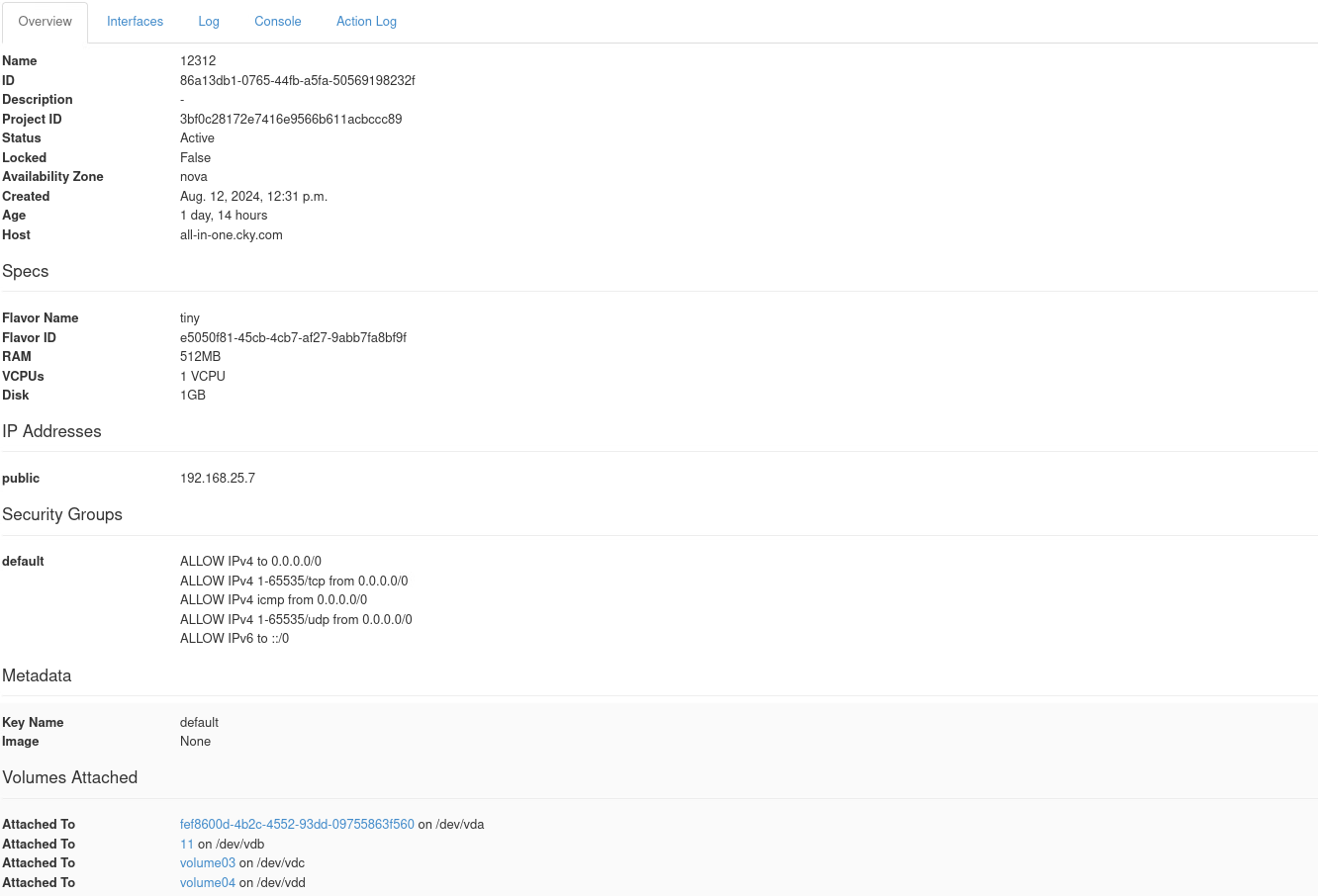


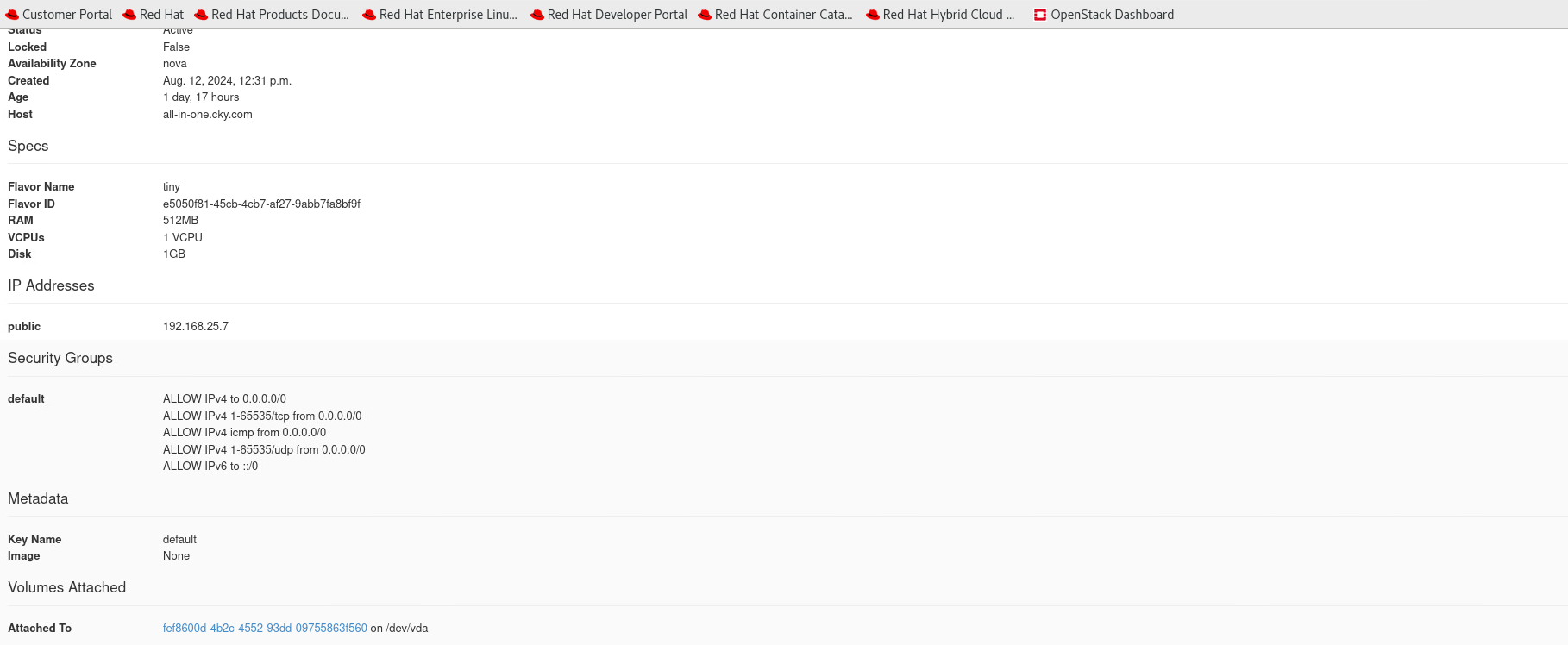
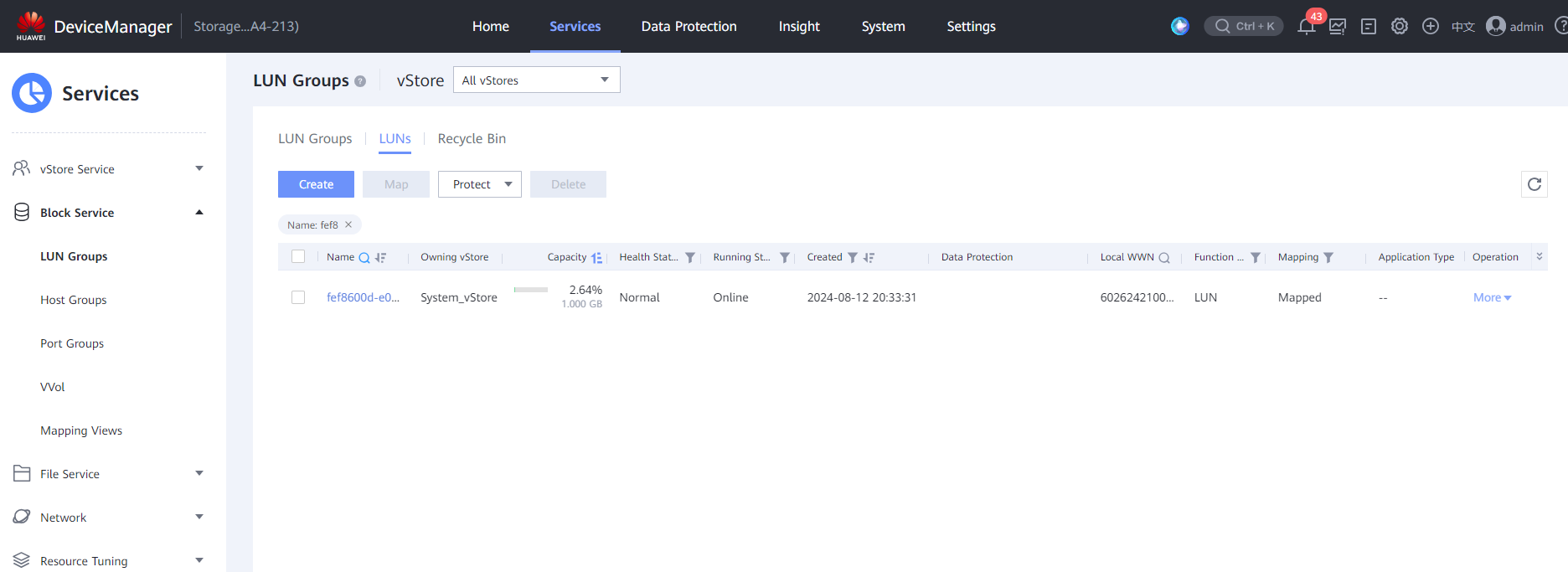
|
Test Conclusion | Passed |
2.6 Extending a Volume
Test Purpose | To verify that OpenStack allows Extending a Volume. |
Test Networking | Huawei OceanStor Dorado Storage Function Compatibility Test Networking 1 |
Prerequisites | The OpenStack environment is correctly configured. The Cinder interface is correctly configured. The device networking is normal. |
Test Procedure | Read and write volume A on the VM. Use vdbench to read and write the file system. Expand volume B and observe the I/O status of volume B. Map volume B to the VM and check whether the capacity of volume B is expanded. Stop the read and write operations on volume A. Unmap and extend this volume B again. Map volume B to the VM and check whether the capacity of volume B is expanded. |
Expected Result | In step 2, I/Os do not return to zero.. In steps 3 and 6, the volume capacity has been expanded |
Test Results | 1. Read and write volume A on the VM. Use vdbench to read and write the file system. 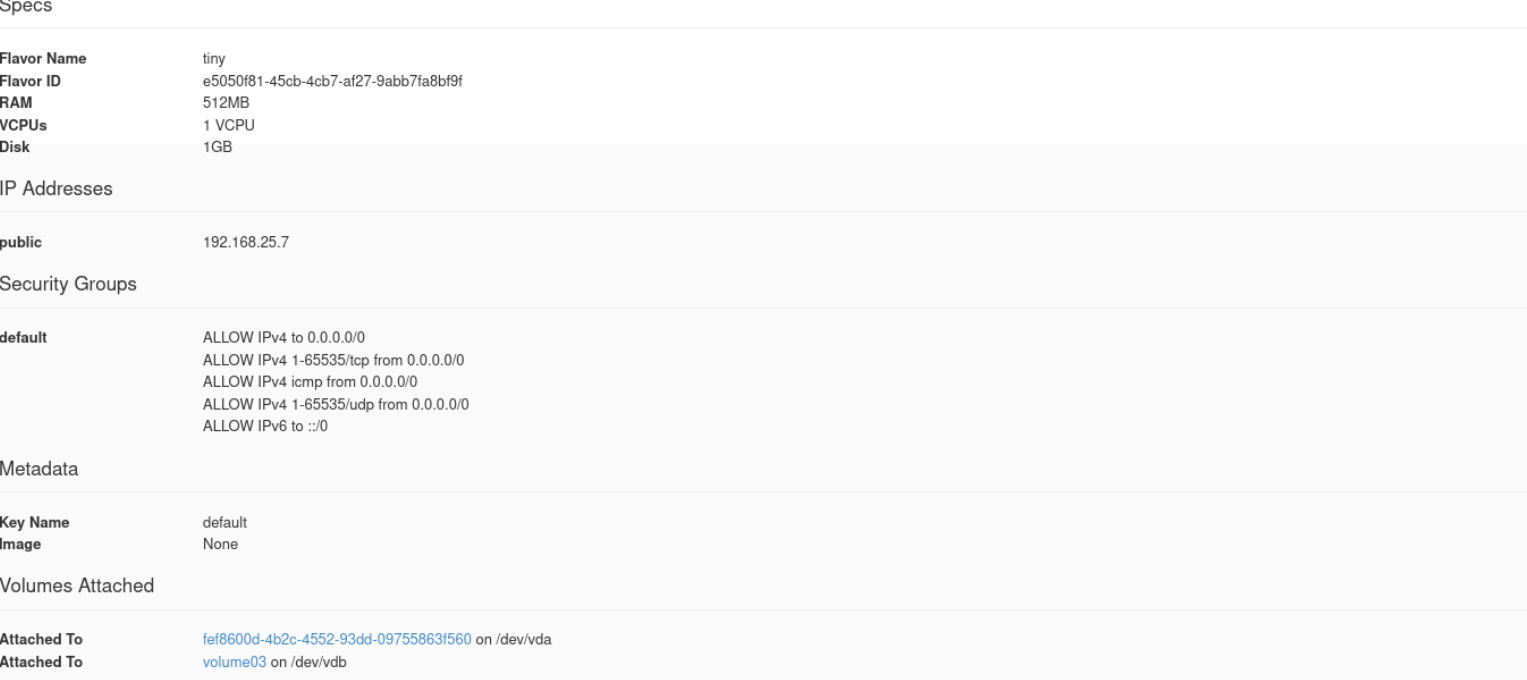   2. Expand volume B and observe the I/O status of volume B. 2. Expand volume B and observe the I/O status of volume B.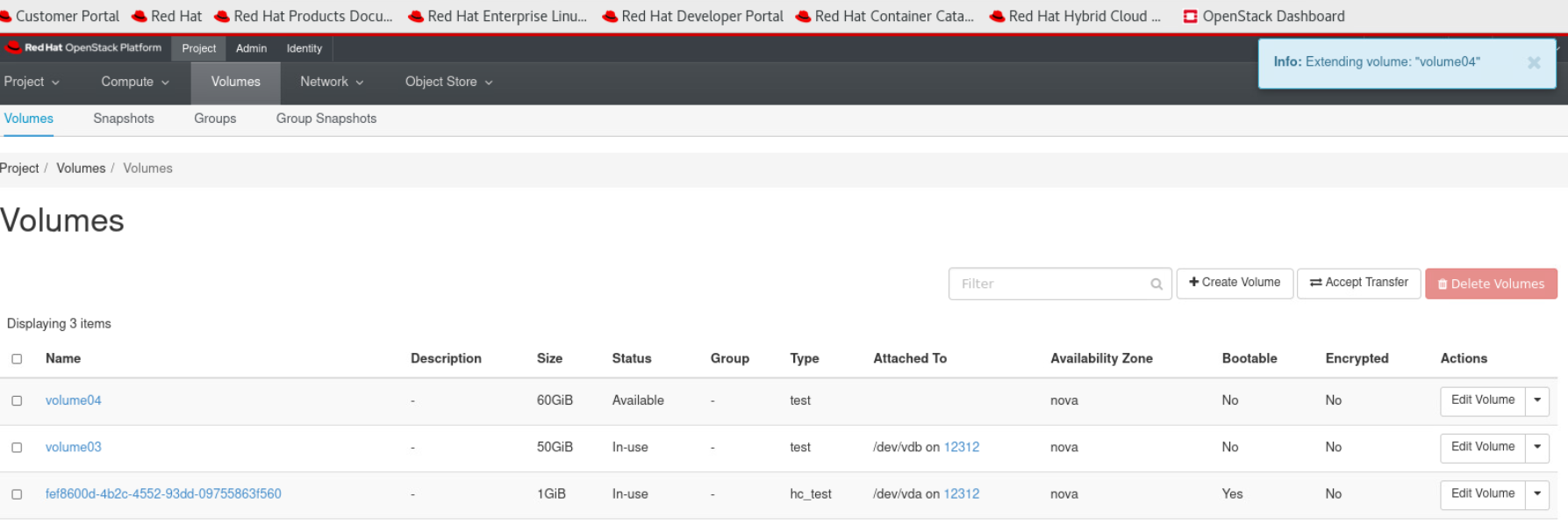 3. Map volume B to the VM and check whether the capacity of volume B is expanded. 3. Map volume B to the VM and check whether the capacity of volume B is expanded.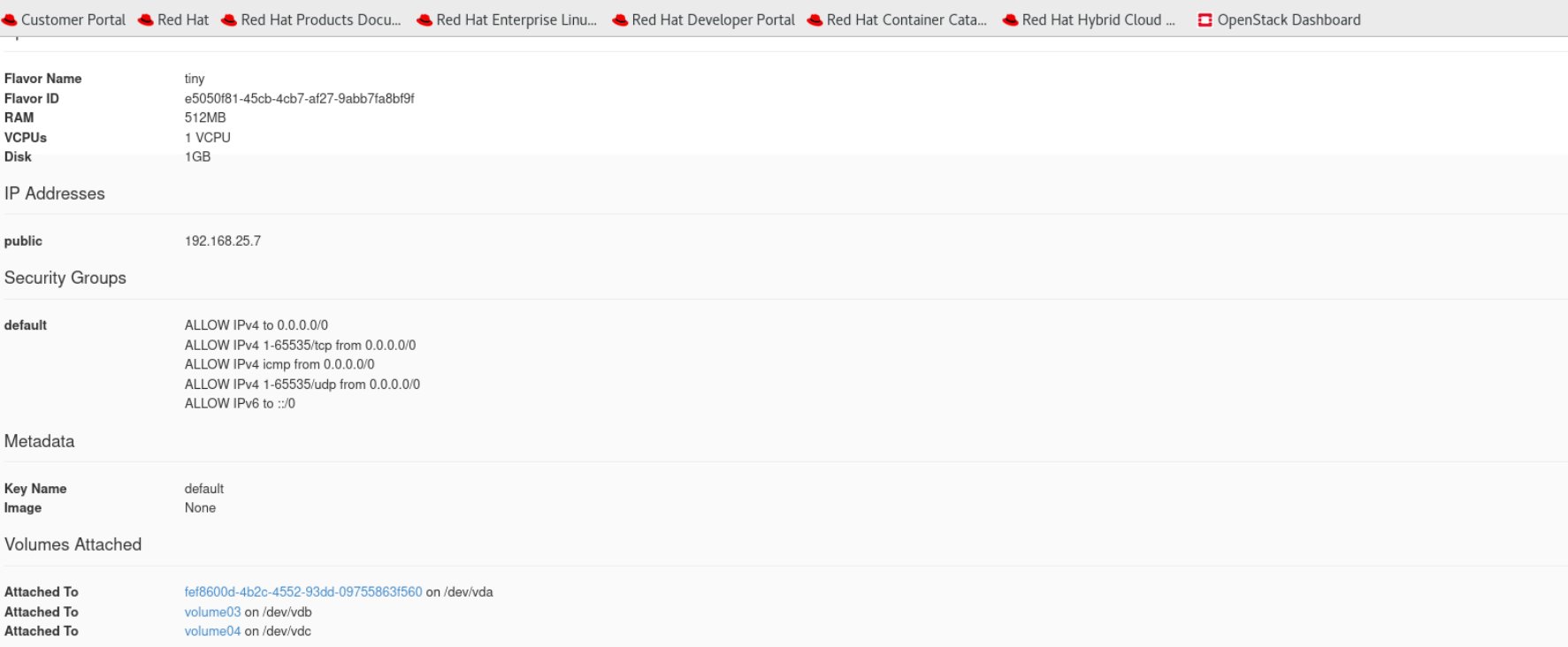   5. Unmap and extend this volume B again. 5. Unmap and extend this volume B again. 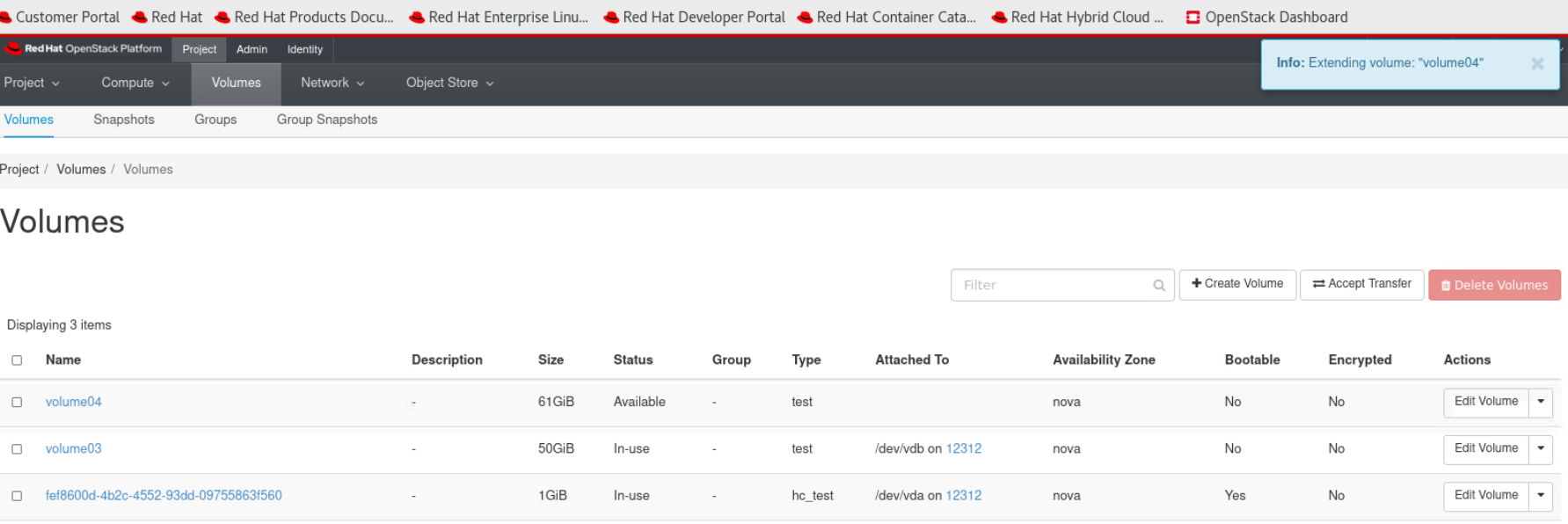 6. Map volume B to the VM and check whether the capacity of volume B is expanded. 6. Map volume B to the VM and check whether the capacity of volume B is expanded. 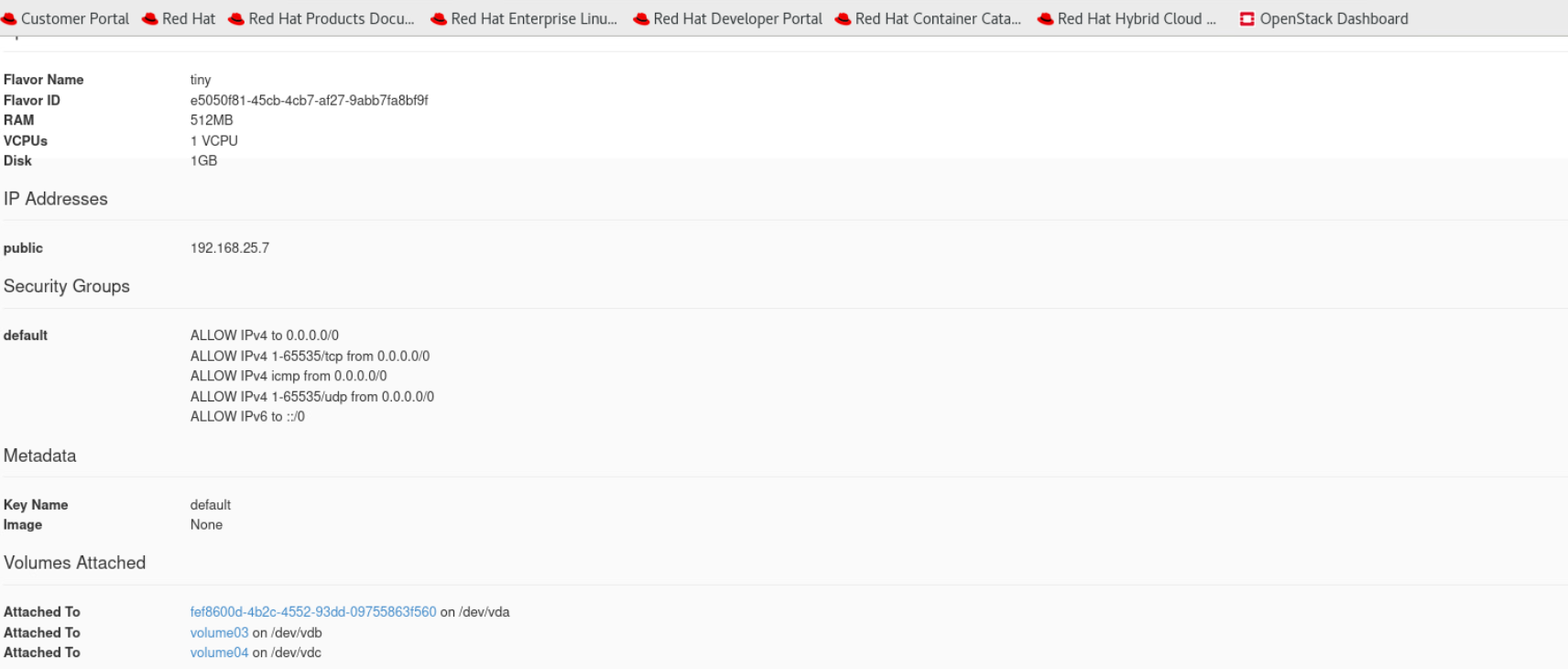  |
Test Conclusion | Passed |
2.7 Suspending And Resuming a VM
Test Purpose | To verify that OpenStack allows suspending and resuming a VM. |
Test Networking | Huawei OceanStor Dorado Storage Function Compatibility Test Networking 1 |
Prerequisites | The OpenStack environment is correctly configured. The Cinder interface is correctly configured. The device networking is normal. The mapping relationship is normal. The VM reads and writes the mapped disk properly. |
Test Procedure | VM service read/write process. Suspending a VM. Restore the VM, view the status of the attached volume, and read and write the attached volume. |
Expected Result | In step 2, the VM is suspended.
|
Test Results | 1. VM service read/write process.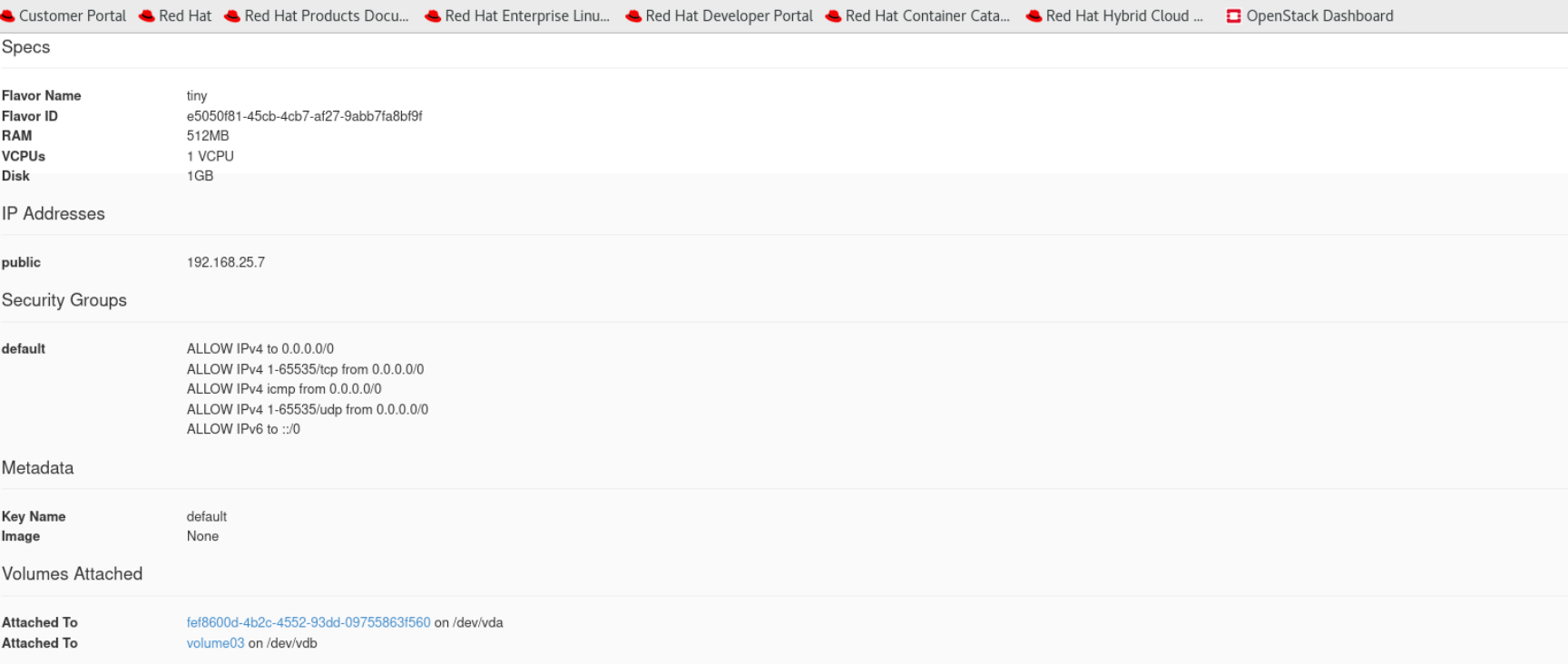
 2. Suspending a VM.   3. Restore the VM, view the status of the attached volume, and read and write the attached volume. 3. Restore the VM, view the status of the attached volume, and read and write the attached volume.   |
Test Conclusion | Passed |
2.8 VM Soft Restart
Test Purpose | To verify that OpenStack allows VM soft restart. |
Test Networking | Huawei OceanStor Dorado Storage Function Compatibility Test Networking 1 |
Prerequisites | The OpenStack environment is correctly configured. The Cinder interface is correctly configured. The device networking is normal. The mapping relationship is normal. The VM reads and writes the mapped disk properly. |
Test Procedure | VM service read/write process. Soft restarting a VM. |
Expected Result | In step 2, the VM is restarted successfully.
|
Test Results | 1. VM service read/write process. 2. Soft restarting a VM. 2. Soft restarting a VM. 3. After the restart is complete, check the status of the attached volume and read and write the attached volume. 3. After the restart is complete, check the status of the attached volume and read and write the attached volume.  |
Test Conclusion | Passed |
2.9 Hard Restarting a VM
Test Purpose | To verify that OpenStack allows hard restarting a VM. |
Test Networking | Huawei OceanStor Dorado Storage Function Compatibility Test Networking 1 |
Prerequisites | The OpenStack environment is correctly configured. The Cinder interface is correctly configured. The device networking is normal. The mapping relationship is normal. The VM reads and writes the mapped disk properly. |
Test Procedure | VM service read/write process. Soft restarting a VM. After the restart is complete, check the status of the attached volume and read and write the attached volume. |
Expected Result | In step 2, the VM is restarted successfully. In step 3, after the restart is complete, the volume can be read and written properly. |
Test Results | 1. VM service read/write process. 2. Soft restarting a VM. 2. Soft restarting a VM. 3. After the restart is complete, check the status of the attached volume and read and write the attached volume. 3. After the restart is complete, check the status of the attached volume and read and write the attached volume. 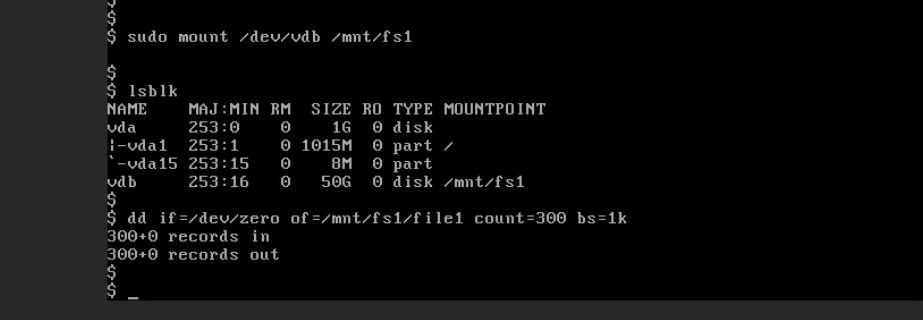 |
Test Conclusion | Passed |
2.10 Deleting a VM
Test Purpose | To verify that OpenStack allows deleting a VM. |
Test Networking | Huawei OceanStor Dorado Storage Function Compatibility Test Networking 1 |
Prerequisites | The OpenStack environment is correctly configured. The Cinder interface is correctly configured. The device networking is normal. The mapping relationship is normal. The VM reads and writes the mapped disk properly. |
Test Procedure | VM service read/write process.
|
Expected Result | In step 2, the VM is successfully deleted or terminated. |
Test Results | 1. VM service read/write process. 2. Delete/Terminate VM   |
Test Conclusion | Passed |
2.11 Compute Node Restarts Unexpectedly
Test Purpose | To verify that OpenStack allows compute node restarts unexpectedly. |
Test Networking | Huawei OceanStor Dorado Storage Function Compatibility Test Networking 1 |
Prerequisites | The OpenStack environment is correctly configured. The Cinder interface is correctly configured. The device networking is normal. The mapping relationship is normal. The VM reads and writes the mapped disk properly. |
Test Procedure | Remove the power supply from the compute node.
|
Expected Result | In step 3, the service is started properly and no exception information is recorded in logs.
|
Test Results | 1. Remove the power supply from the compute node. 2. Reconnect the power supply to the compute node after 1 minute. 2. Reconnect the power supply to the compute node after 1 minute. 3. After the compute node is started, check the service running status. Log in to the VM to check the mapped disk. 3. After the compute node is started, check the service running status. Log in to the VM to check the mapped disk.   4. On the OpenStack page, attach the volume to the VM again. 4. On the OpenStack page, attach the volume to the VM again.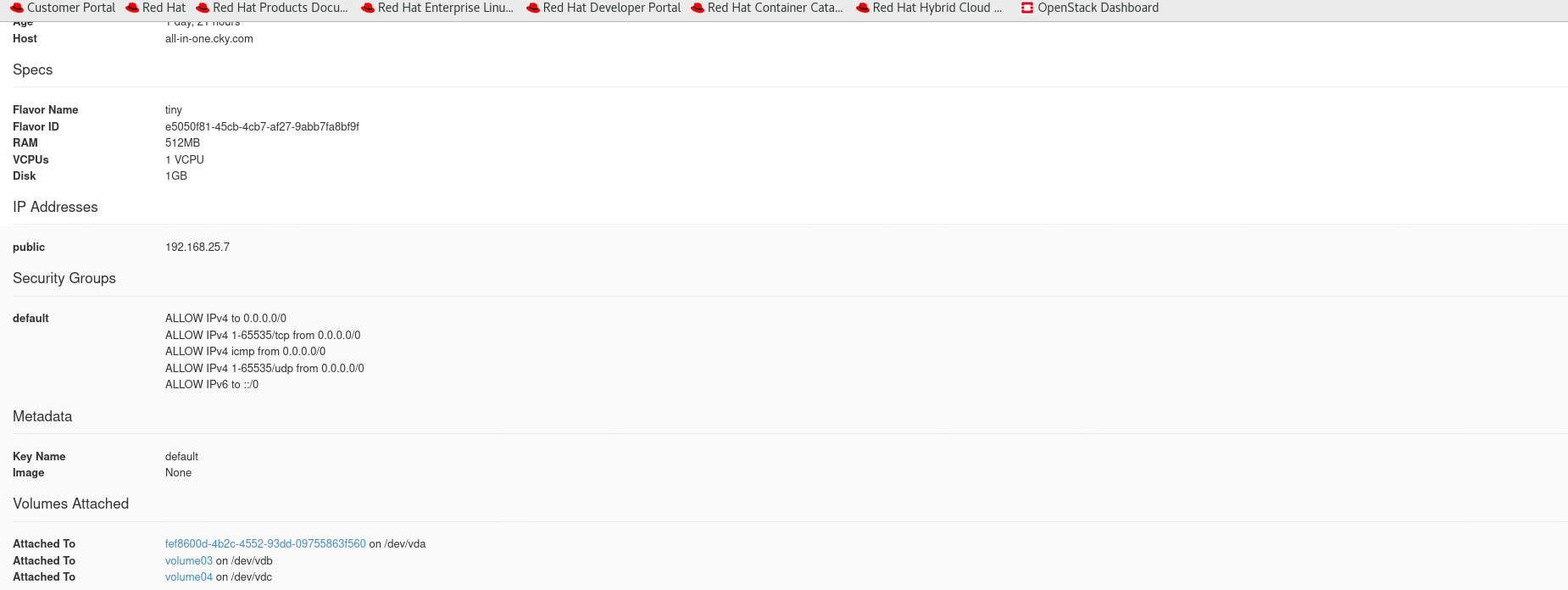  |
Test Conclusion | Passed |
2.12 Creating a Snapshot Volume
Test Purpose | To verify that OpenStack allows creating a snapshot volume. |
Test Networking | Huawei OceanStor Dorado Storage Function Compatibility Test Networking 1 |
Prerequisites | The OpenStack environment is correctly configured. The device networking is normal. Two volumes have been created on OpenStack and are running properly. |
Test Procedure |
|
Expected Result | In step 4, I/Os do not return to zero.
|
Test Results | 1. Write a file named txt and some data into the mapped original volume 1. 2. Read and write the original volume 1 on the VM. 2. Read and write the original volume 1 on the VM. 3. Take a snapshot of the original volume 1. 3. Take a snapshot of the original volume 1.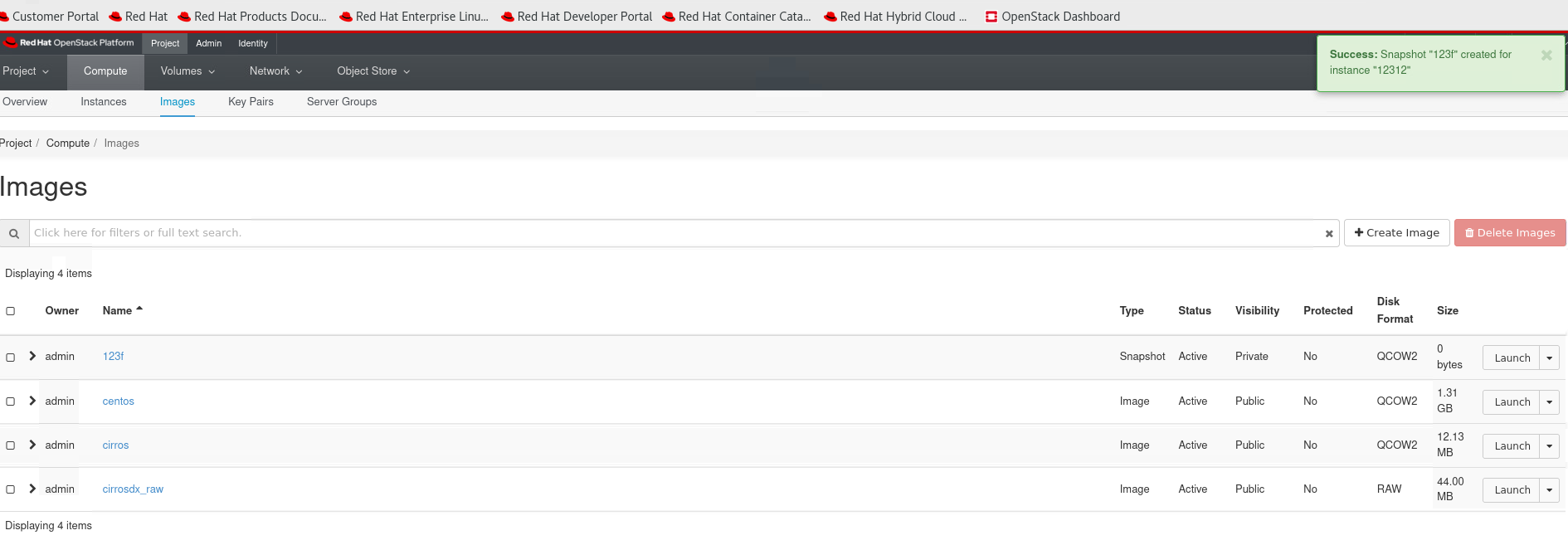 4. Observe the I/O status of volume 1. 4. Observe the I/O status of volume 1. 5. Check whether the snapshot information is correct on the array. 5. Check whether the snapshot information is correct on the array.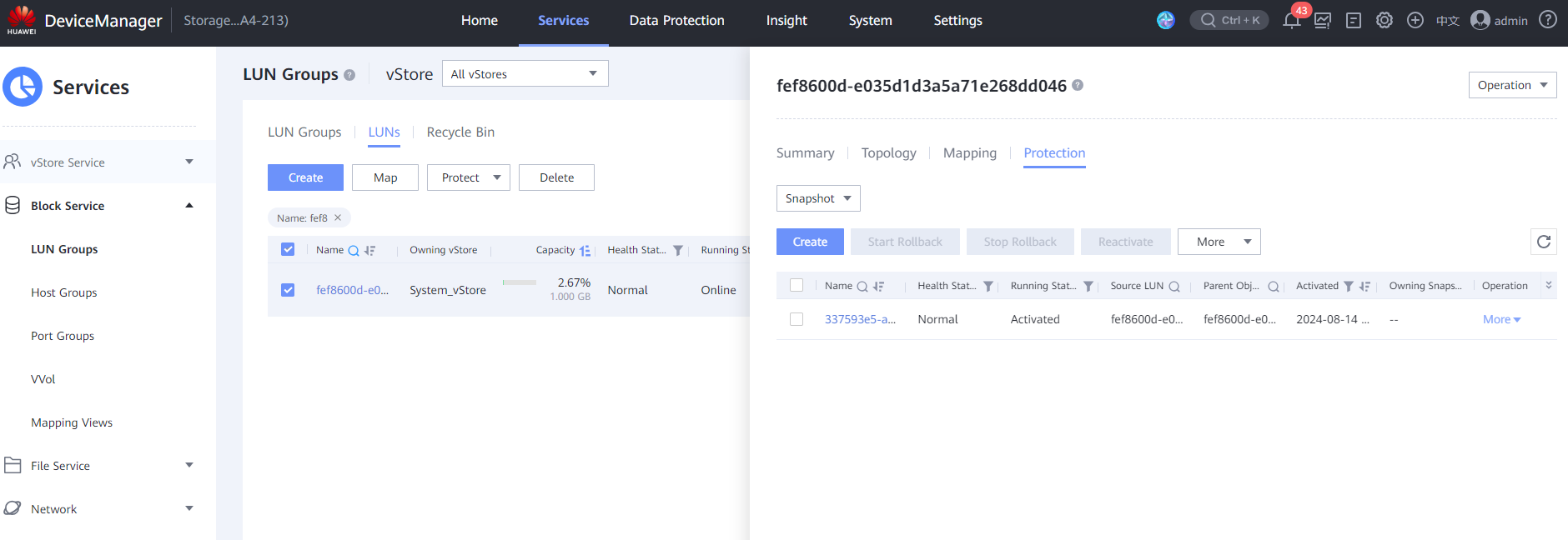
|
Test Conclusion | Passed |
2.13 Delete Snapshot Volume
Test Purpose | To verify that OpenStack allows delete snapshot volume. |
Test Networking | Huawei OceanStor Dorado Storage Function Compatibility Test Networking 1 |
Prerequisites | The OpenStack environment is correctly configured. The Cinder interface is correctly configured. The device networking is normal. A resource pool has been configured on the array
|
Test Procedure | Delete volume from snapshot volume. |
Expected Result | In step 1, the deletion is successful. |
Test Results | 1. Delete volume from snapshot volume  
  |
Test Conclusion | Passed |
2.14 Creating a volume from a snapshot volume and mapping the volume
Test Purpose | To verify that OpenStack allows creating a volume from a snapshot volume and mapping the volume. |
Test Networking | Huawei OceanStor Dorado Storage Function Compatibility Test Networking 1 |
Prerequisites | The OpenStack environment is correctly configured. The Cinder interface is correctly configured. The device networking is normal. The mapping relationship is normal. Two volumes have been created on OpenStack and are running properly. |
Test Procedure | Write a file named txt to volume A that has been mapped. After data is written, use sync and umount to flush data to disks. Take a snapshot of volume A after disk flushing.
|
Expected Result |
|
Test Results | 1. Write a file named txt to volume A that has been mapped. After data is written, use sync and umount to flush data to disks. Take a snapshot of volume A after disk flushing.
 2. Read and write volume A on the VM. 2. Read and write volume A on the VM. 3. Create volume B from the snapshot volume. 3. Create volume B from the snapshot volume.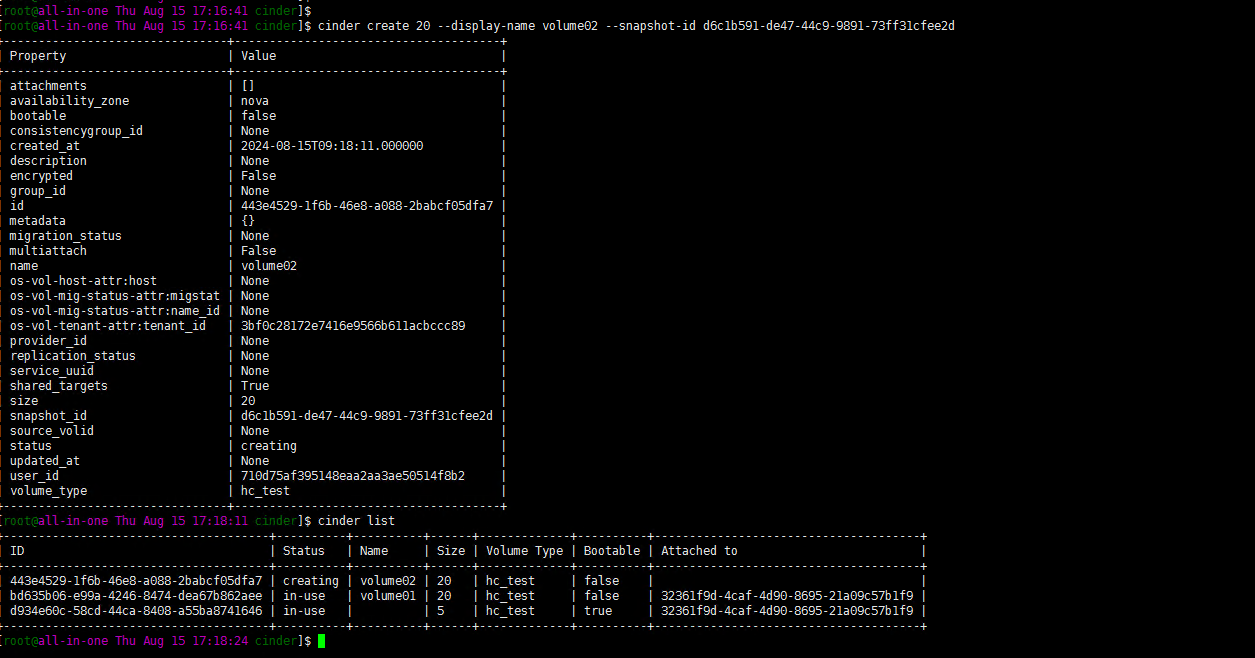 4. On the array, view the LUN copy relationship and progress. 4. On the array, view the LUN copy relationship and progress. 5. Attach this newly created volume B to the virtual machine. 
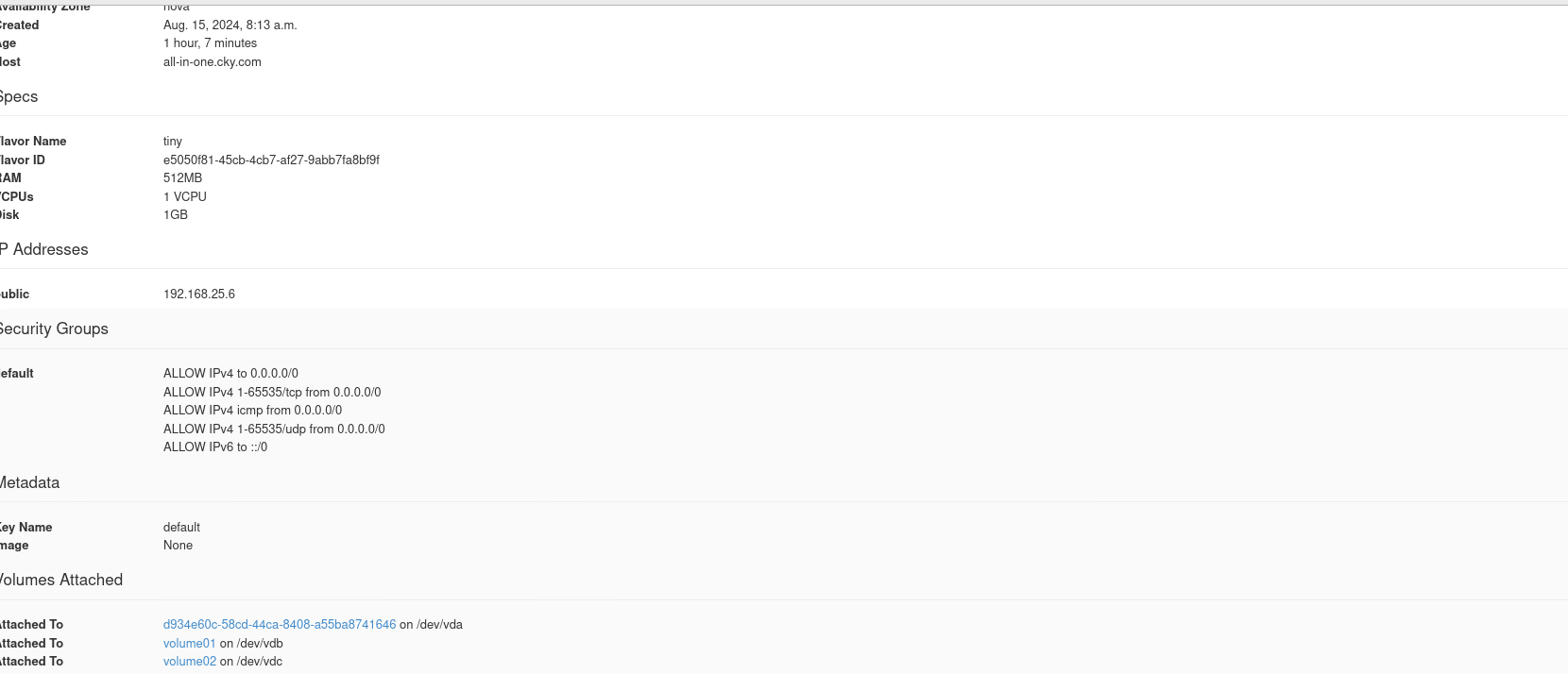
 7. Read and write volume B on the VM. 7. Read and write volume B on the VM.
|
Test Conclusion | Passed |
2.15 Delete volume from snapshot volume
Test Purpose | To verify that OpenStack allows delete volume from snapshot volume. |
Test Networking | Huawei OceanStor Dorado Storage Function Compatibility Test Networking 1 |
Prerequisites | The OpenStack environment is correctly configured. The Cinder interface is correctly configured. The device networking is normal. The mapping relationship is normal. Two volumes have been created on OpenStack and are running properly. |
Test Procedure | Delete volume from snapshot volume. |
Expected Result | In step 1, the deletion is successful. |
Test Results | 1. Delete volume from snapshot volume.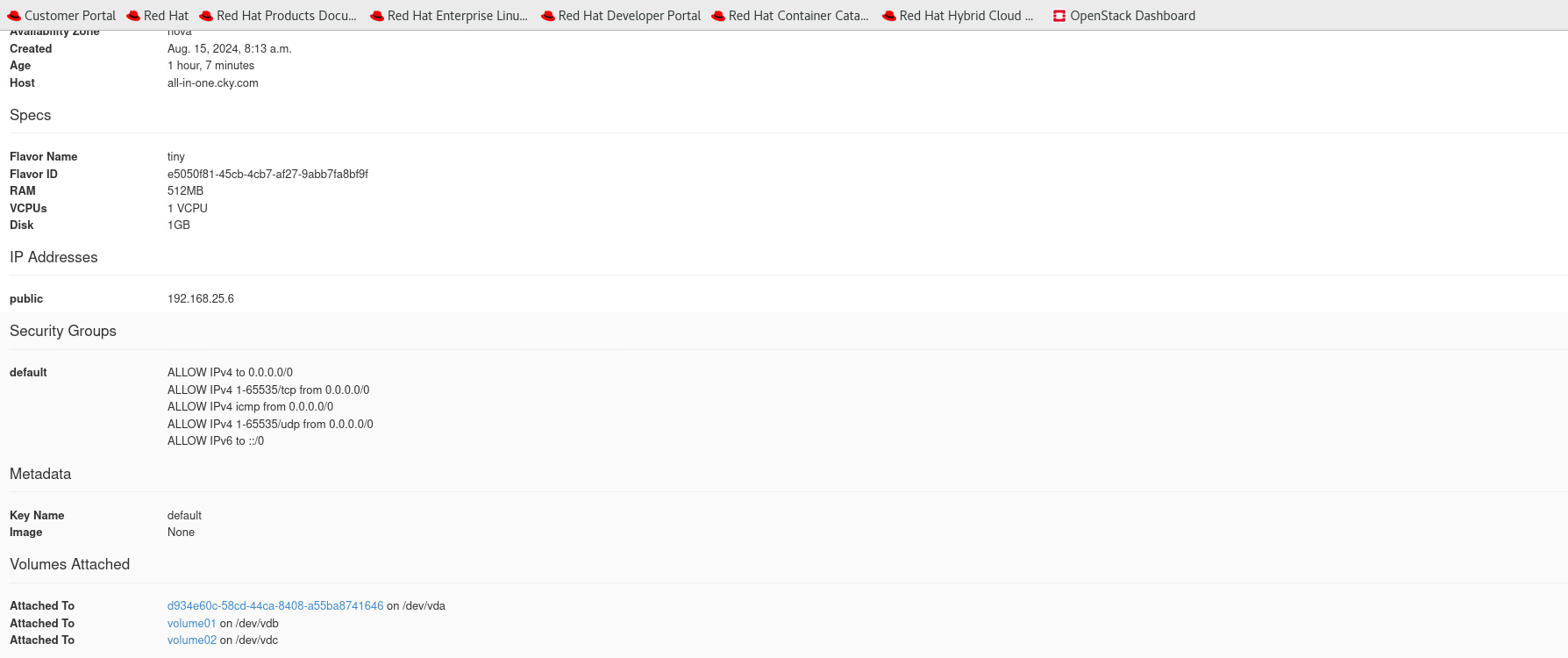  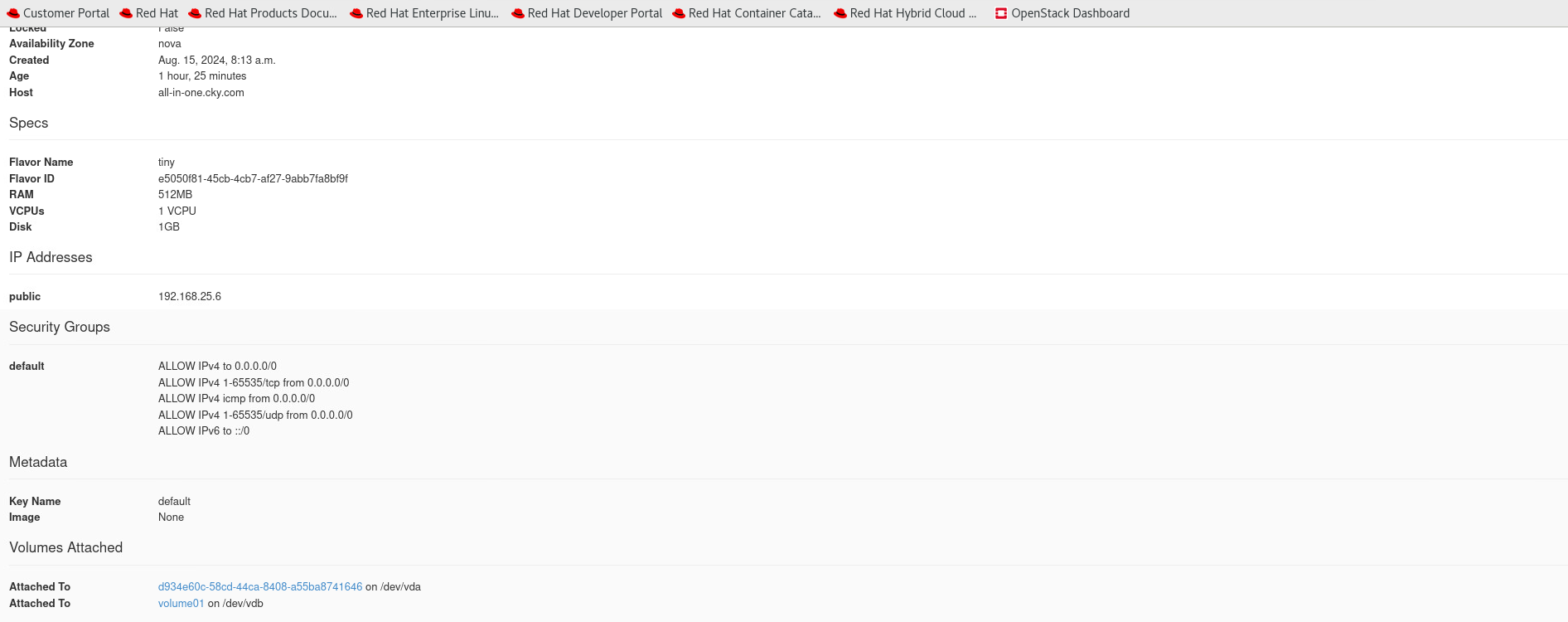   |
Test Conclusion | Passed |
2.16 Create a volume from a volume and map the volume
Test Purpose | To verify that OpenStack allows create a volume from a volume and map the volume. |
Test Networking | Huawei OceanStor Dorado Storage Function Compatibility Test Networking 1 |
Prerequisites | The OpenStack environment is correctly configured. The Cinder interface is correctly configured. The device networking is normal. The mapping relationship is normal. Two volumes have been created on OpenStack and are running properly. |
Test Procedure |
|
Expected Result | In step 3, the volume is successfully created.
|
Test Results | 1. Create file txt in mapped volume 1 and write data into the file.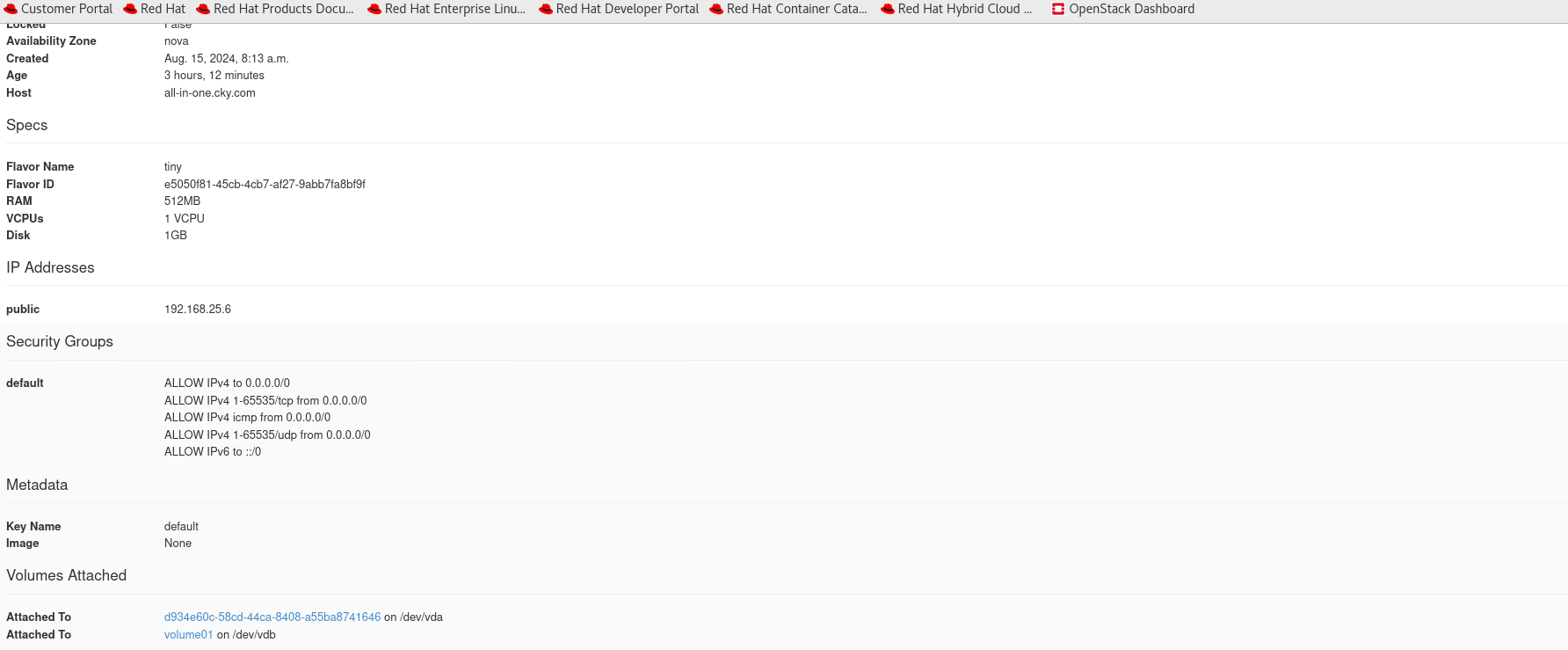   2. Read and write volume 1 on the VM.  3. Create volume 2 from volume 1.  4. On the array, view the LUN copy relationship and progress.  5. Attach this newly created volume 2 to the virtual machine.  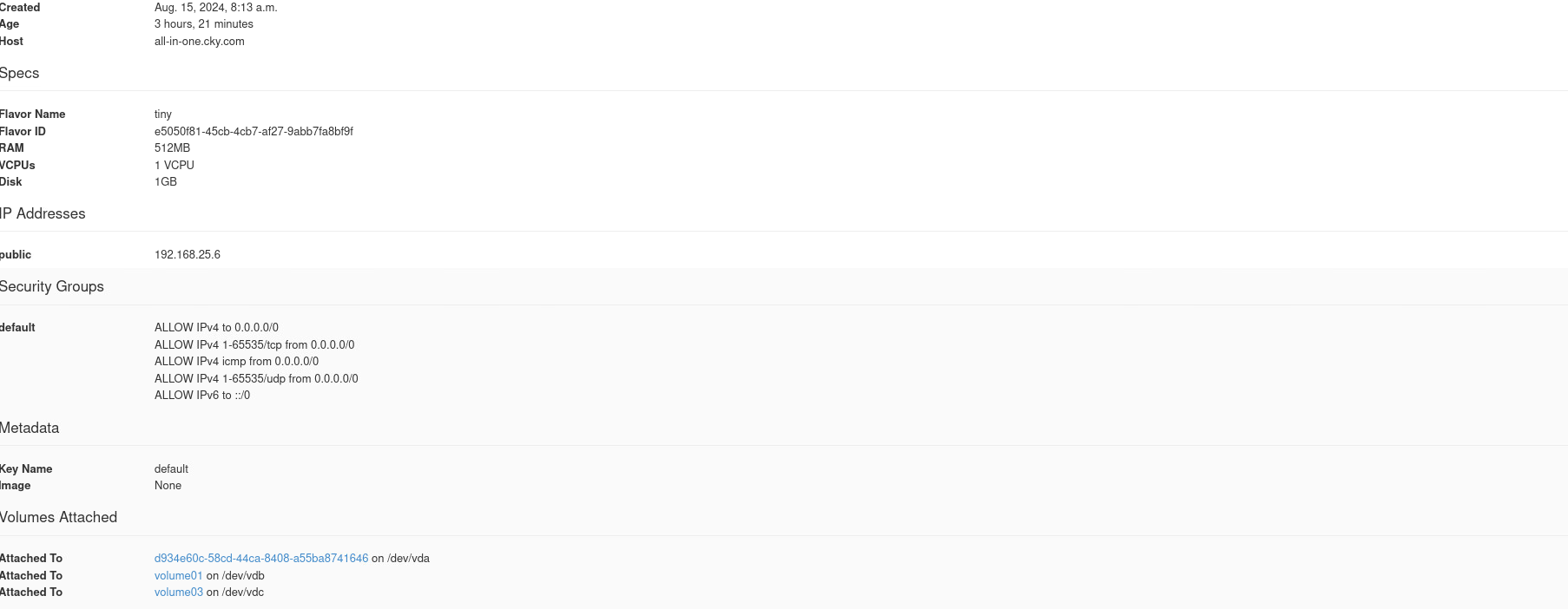 6. Check whether the .txt file exists and whether the data is normal.  7. Read and write volume 2 on the VM.  |
Test Conclusion | Passed |
2.17 Delete Volume From Volume
Test Purpose | To verify that OpenStack allows delete volume from volume. |
Test Networking | Huawei OceanStor Dorado Storage Function Compatibility Test Networking 1 |
Prerequisites | The OpenStack environment is correctly configured. The Cinder interface is correctly configured. The device networking is normal. The mapping relationship is normal. Two volumes have been created on OpenStack and are running properly. |
Test Procedure | Delete volume from volume. |
Expected Result | In step 1, the deletion is successful. |
Test Results | 1. Delete volume from volume.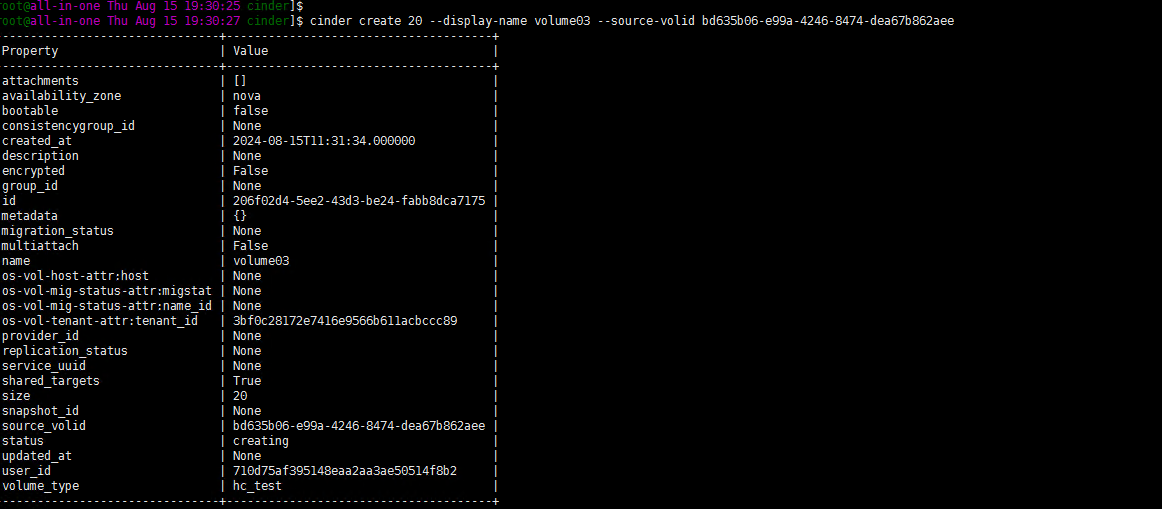  |
Test Conclusion | Passed |
2.18 Deleting a volume from a mirror
Test Purpose | To verify that OpenStack allows deleting a volume from a mirror. |
Test Networking | Huawei OceanStor Dorado Storage Function Compatibility Test Networking 1 |
Prerequisites | The OpenStack environment is correctly configured. The Cinder interface is correctly configured. The device networking is normal. The mapping relationship is normal. Two volumes have been created on OpenStack and are running properly. |
Test Procedure | Deleting a volume from a mirror. |
Expected Result | In step 1, the deletion is successful. |
Test Results |
   |
Test Conclusion | Passed |
2.19 Deleting an Image
Test Purpose | To verify that OpenStack allows deleting an image. |
Test Networking | Huawei OceanStor Dorado Storage Function Compatibility Test Networking 1 |
Prerequisites | The OpenStack environment is correctly configured. The Cinder interface is correctly configured. The device networking is normal. The mapping relationship is normal. An image has been created on OpenStack. |
Test Procedure | Check the mirroring status.
|
Expected Result | In step 2, the image is deleted successfully. |
Test Results |
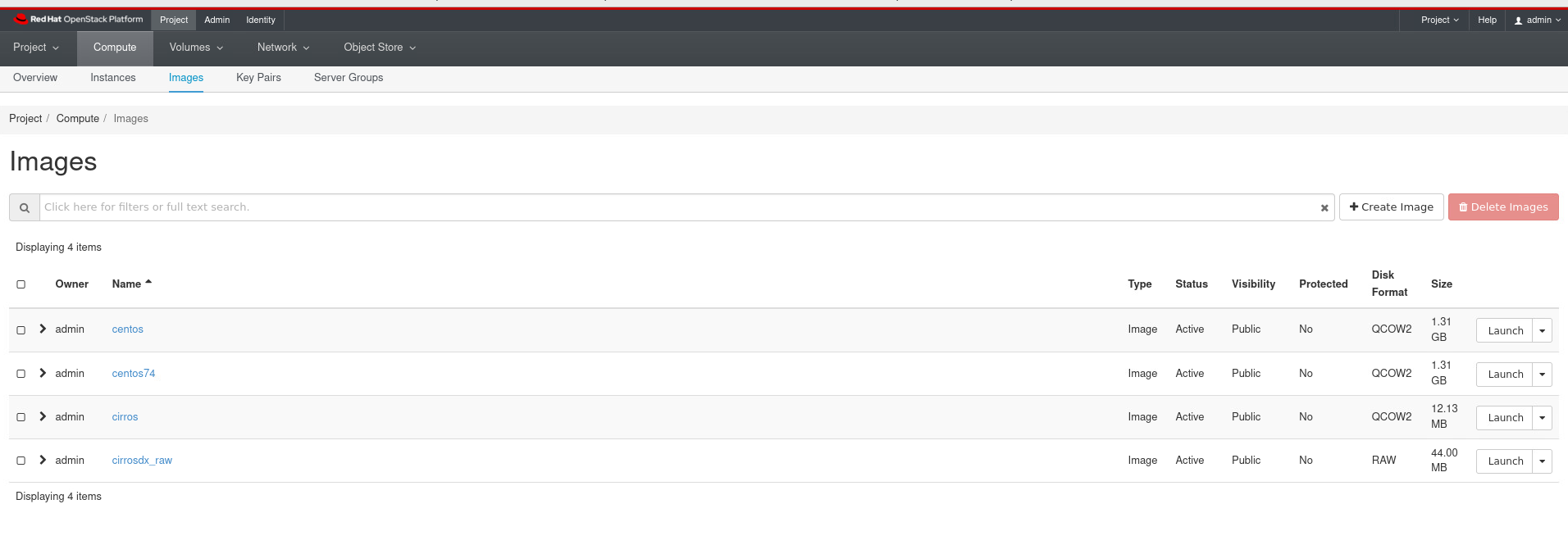
 |
Test Conclusion | Passed |
2.20 IOPS Volume Type Test
Test Purpose | To verify that OpenStack allows IOPS volume type. |
Test Networking | Huawei OceanStor Dorado Storage Function Compatibility Test Networking 1 |
Prerequisites | The OpenStack environment is correctly configured. The Cinder interface is correctly configured. The device networking is normal. The mapping relationship is normal. Two volumes have been created on OpenStack and are running properly. |
Test Procedure | Create a volume type, set consumer to front-end, and specify the read/write IOPS policy. (read IOPS: 100, write IOPS: 100).
|
Expected Result | In step 1, the QoS volume type is successfully created. In step 2, the QoS volume is successfully created. In step 3, the VM can read data from and write data into the volume. In step 4, the QoS policy takes effect and the performance complies with the policy. |
Test Results | 1. Create a volume type, set consumer to front-end, and specify the read/write IOPS policy. (read IOPS: 20, write IOPS: 20).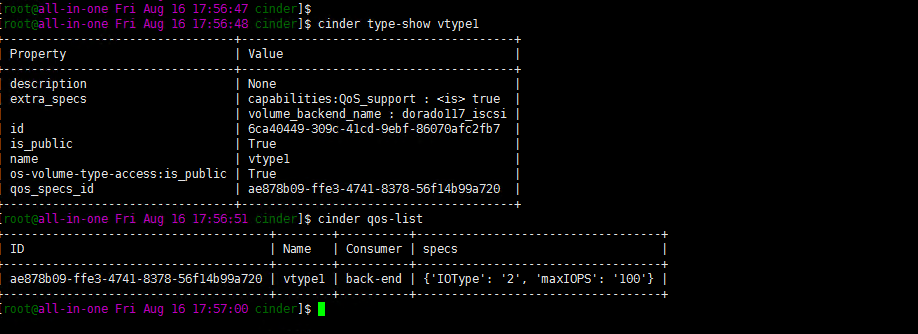 2. On the OpenStack, create a QoS volume of this volume type and check whether the volume is successfully created. 2. On the OpenStack, create a QoS volume of this volume type and check whether the volume is successfully created.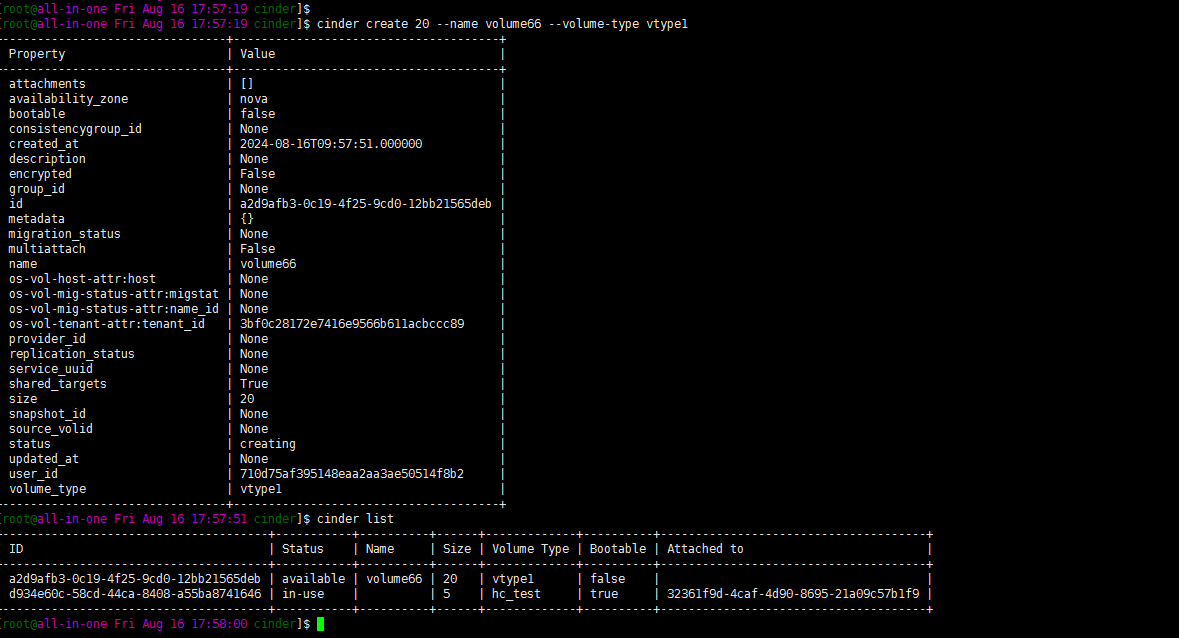  3. Attach the volume to the VM and perform service read and write operations on the QoS volume. 

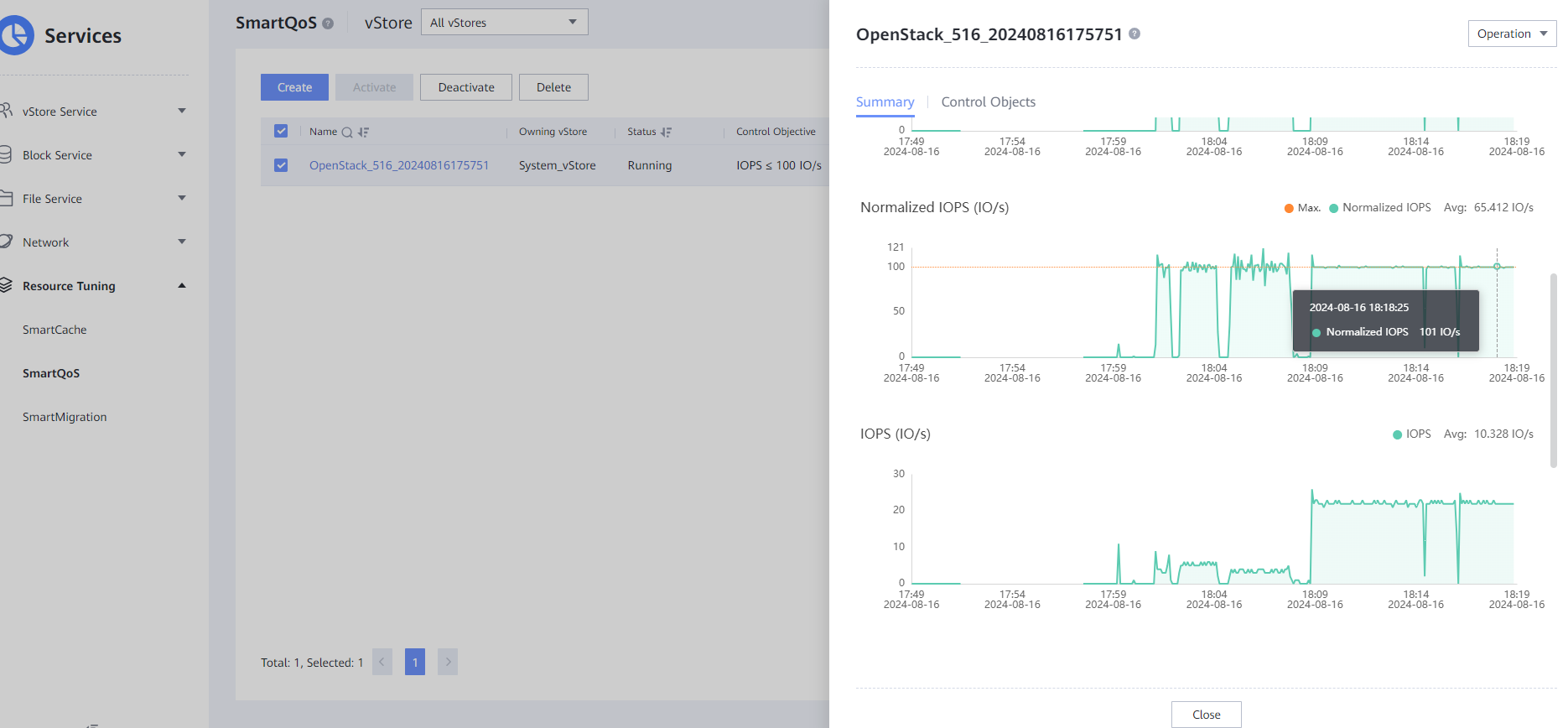
|
Test Conclusion | Passed |
2.21 Bandwidth Volume Type Test
Test Purpose | To verify that OpenStack allows bandwidth volume type. |
Test Networking | Huawei OceanStor Dorado Storage Function Compatibility Test Networking 1 |
Prerequisites | The OpenStack environment is correctly configured. The Cinder interface is correctly configured. The device networking is normal. The mapping relationship is normal. Two volumes have been created on OpenStack and are running properly. |
Test Procedure | Create a volume type, set consumer to front-end, and specify the read and write bandwidth policies. (Read bandwidth: 1; write bandwidth: 1) Create a throughput volume of this type on the OpenStack and check whether the volume is successfully created. Attach the volume to a VM and perform read and write operations on the Throughput volume. Check whether the throughput test of the volume takes effect. Check whether the performance complies with the preset throughput policy. |
Expected Result | In step 1, the throughput volume type is successfully created. In step 2, the throughput volume is successfully created. In step 3, the VM can read data from and write data into the volume. In step 4, the throughput policy of the volume takes effect and the performance complies with the throughput policy. |
Test Results | 1. Create a volume type, set consumer to front-end, and specify the read and write bandwidth policies. (Read bandwidth: 1; write bandwidth: 1)   4. Check whether the throughput test of the volume takes effect. Check whether the performance complies with the preset throughput policy. 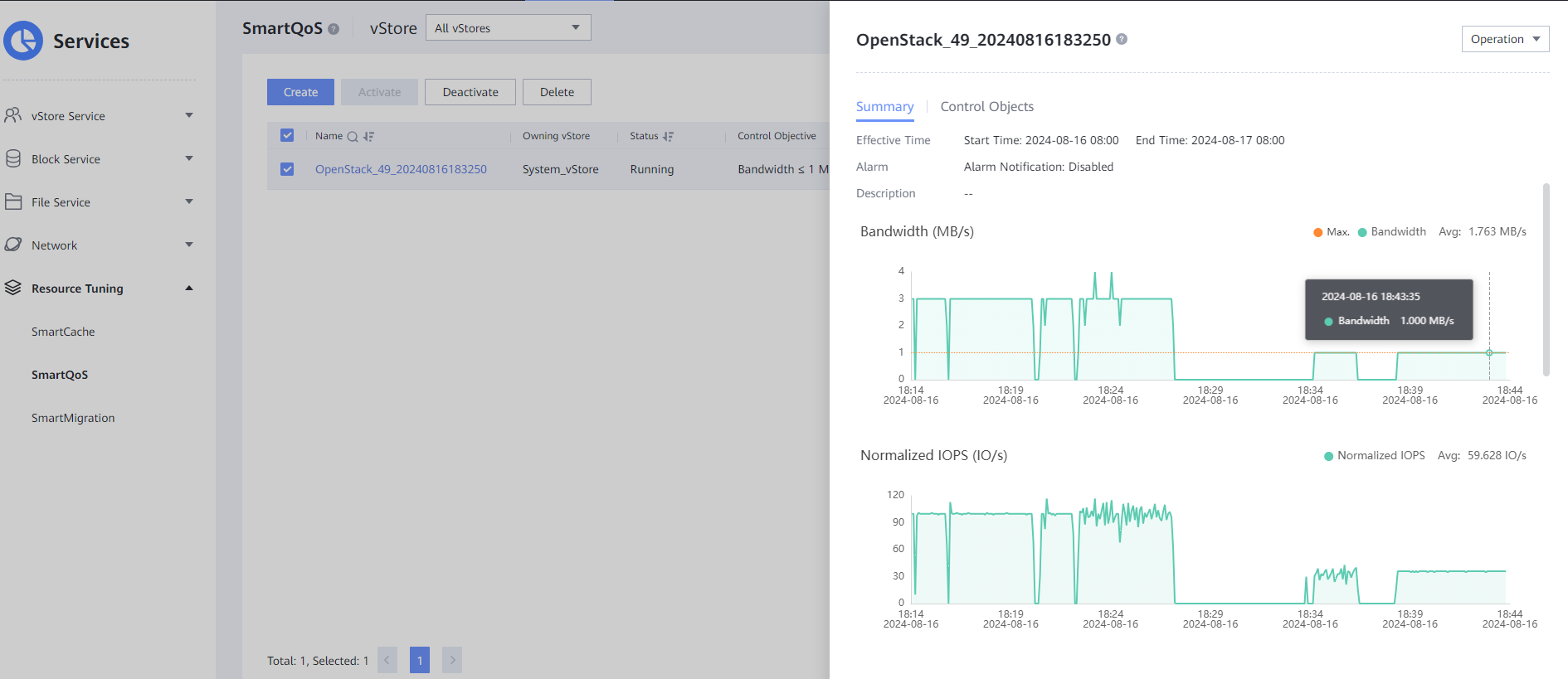 |
Test Conclusion | Passed |
2.22 After the backend QoS is modified, expand the capacity of the volume.
Test Purpose | To verify that OpenStack allows after the backend QoS is modified, expand the capacity of the volume. |
Test Networking | Huawei OceanStor Dorado Storage Function Compatibility Test Networking 1 |
Prerequisites | The OpenStack environment is correctly configured. The Cinder interface is correctly configured. The device networking is normal. The mapping relationship is normal. |
Test Procedure | Create a volume type, set consumer to back-end, and specify the read and write IOPS policies. Create a QoS volume of this type on OpenStack and check whether the volume is successfully created. Create four volumes of the IOPS and Bandwidth types. Change the volume type, set IOPS and Bandwidth, expand the capacity, and check the QoS and capacity on the storage array. |
Expected Result | In step 2, the volume is successfully created. In step 4, the QoS and capacity of the array are correct. |
Test Results | 1. Create a volume type, set consumer to back-end, and specify the read and write IOPS policies. 3. Create four volumes of the IOPS and Bandwidth types. |
Test Conclusion | Passed |
2.23 Snapshot restore to volume
Test Purpose | To verify that OpenStack allows snapshot restore to volume. |
Test Networking | Huawei OceanStor Dorado Storage Function Compatibility Test Networking 1 |
Prerequisites | The OpenStack environment is correctly configured. The Cinder interface is correctly configured. The device networking is normal. A resource pool has been configured on the storage array. |
Test Procedure | Create volume A and write data to volume A. Create snapshot B for volume A. Write data to volume A. Restore snapshot B to volume A and view the data of volume A. |
Expected Result | In step 4, data on volume A is the same as that in step 1. |
Test Results | 1. Create volume A and write data to volume A.
  |
Test Conclusion | Passed |
2.24 Hard Restarting a VM After the Storage Device Resets Abnormally
Test Purpose | To verify that OpenStack allows hard restarting a VM after the storage device resets abnormally. |
Test Networking | Huawei OceanStor Dorado Storage Function Compatibility Test Networking 1 |
Prerequisites | The OpenStack environment is correctly configured. The Cinder interface is correctly configured. The device networking is normal. The mapping relationship is normal. A resource pool has been configured on the storage array. |
Test Procedure | Hard restart the VM. After the storage device is powered on, wait until the storage device is started properly and hard restart the VM. |
Expected Result | In step 1, the VM is hard restarted successfully.
|
Test Results | 1. Hard restart the VM.  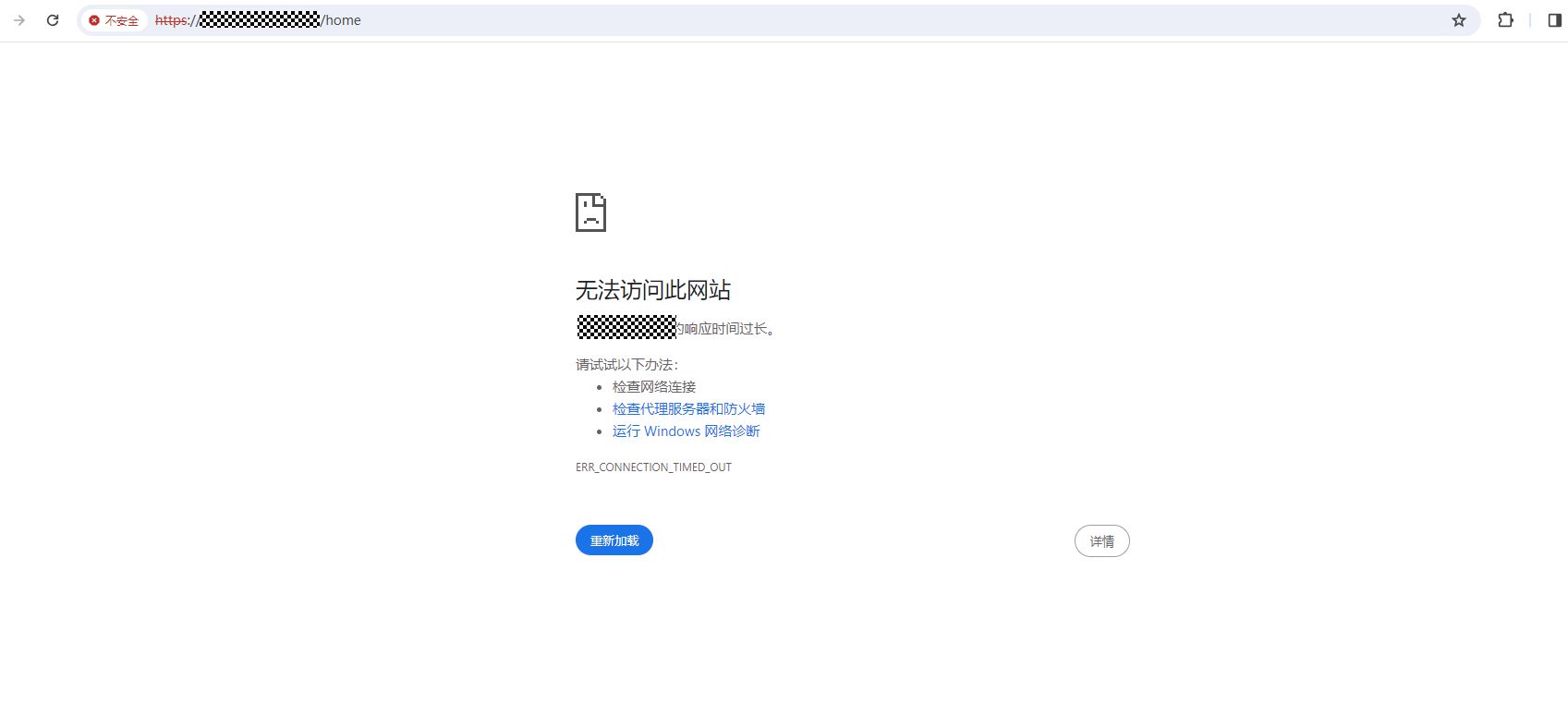 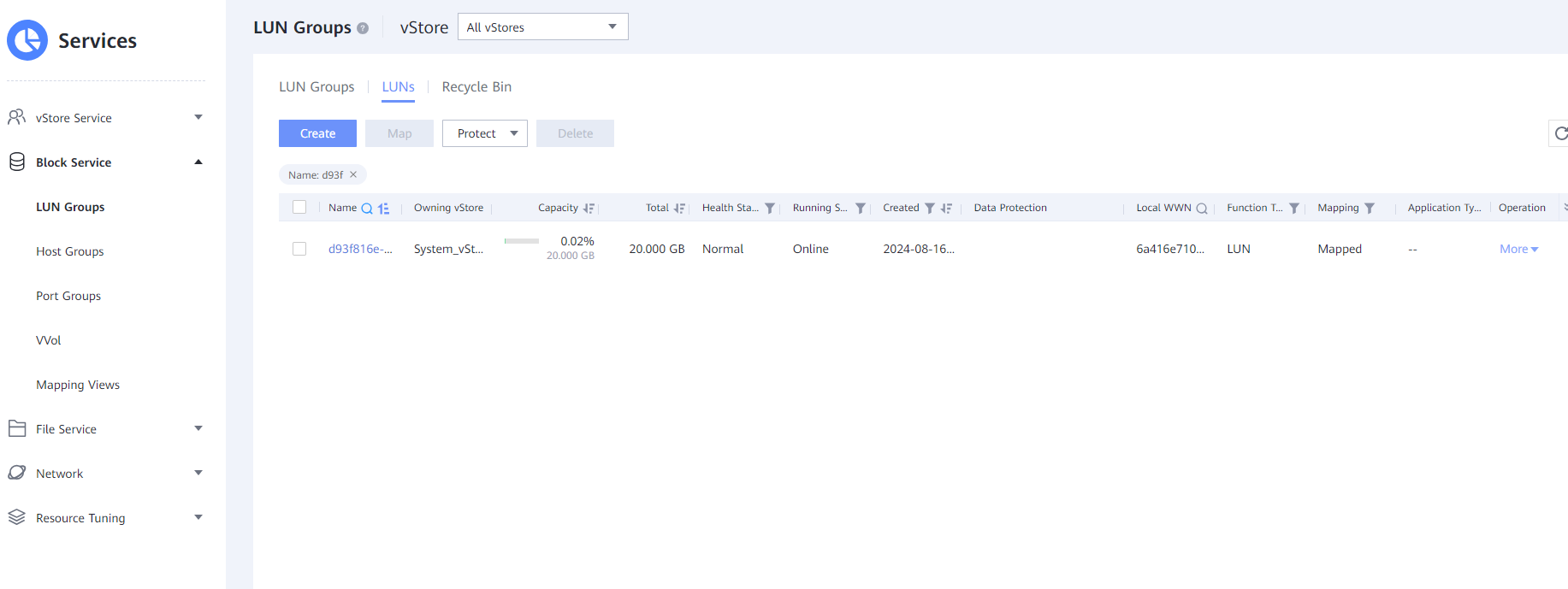   |
Test Conclusion | Passed |
2.25 After the storage device is reset abnormally, run the Shelve Instance and Unshelve Instance commands on the VM.
Test Purpose | To verify that OpenStack allows run the Shelve Instance and Unshelve Instance commands on the VM,after the storage device is reset abnormally. |
Test Networking | Huawei OceanStor Dorado Storage Function Compatibility Test Networking 1 |
Prerequisites | The OpenStack environment is correctly configured. The Cinder interface is correctly configured. The device networking is normal. The mapping relationship is normal. A resource pool has been configured on the storage array. |
Test Procedure | Shelve instances for VMs. Unshelve instances on the VM. Power on the storage device after an unexpected power failure. After the storage device is started properly, perform Shelve Instance on the VM. Power on the storage device after an unexpected power-off. After the storage device is started properly, perform Unshelve Instance on the VM. |
Expected Result |
|
Test Results | 1. Shelve instances for VMs. 2. Unshelve instances on the VM. |
Test Conclusion | Passed |



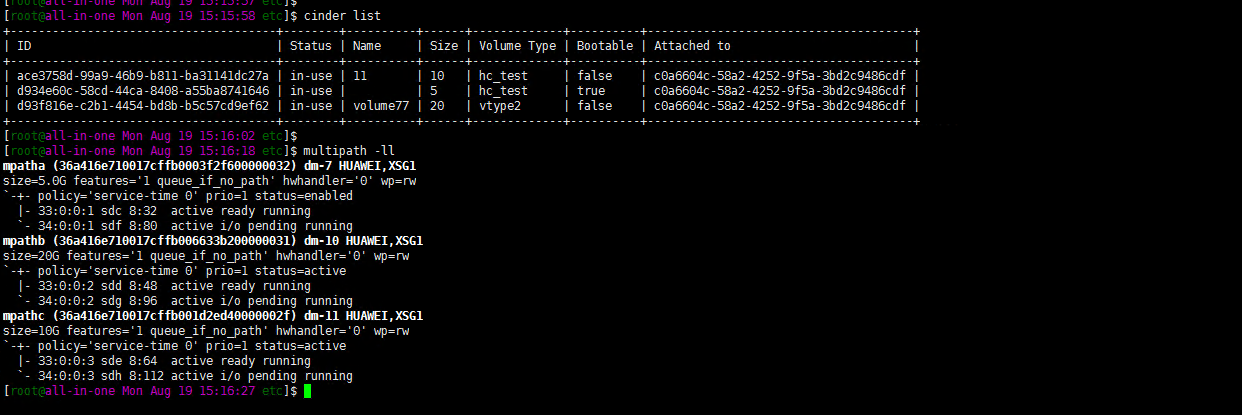
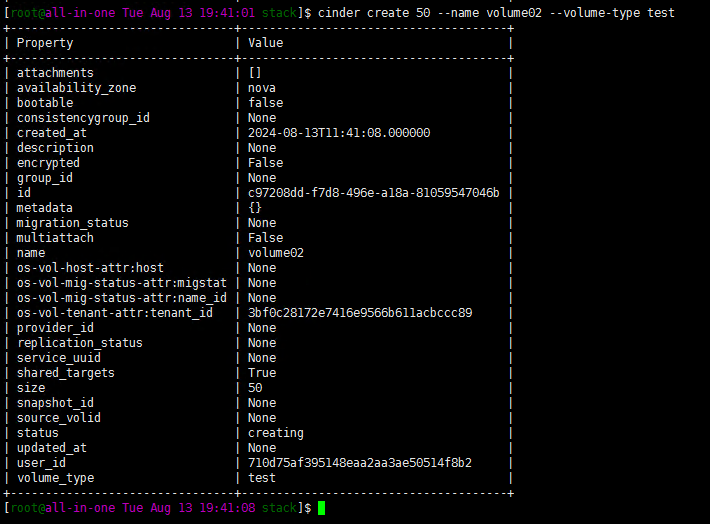
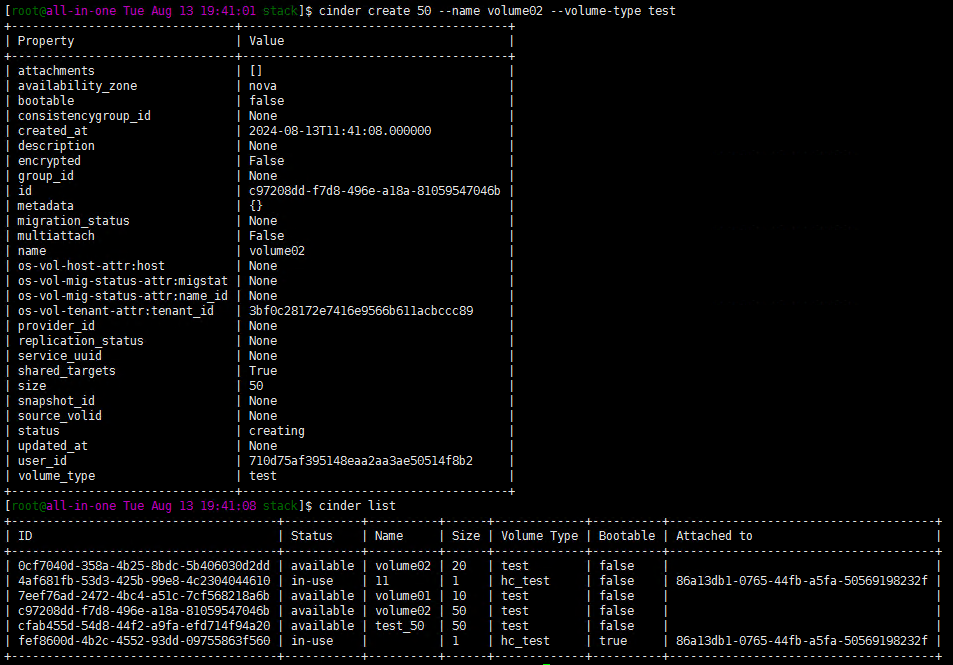
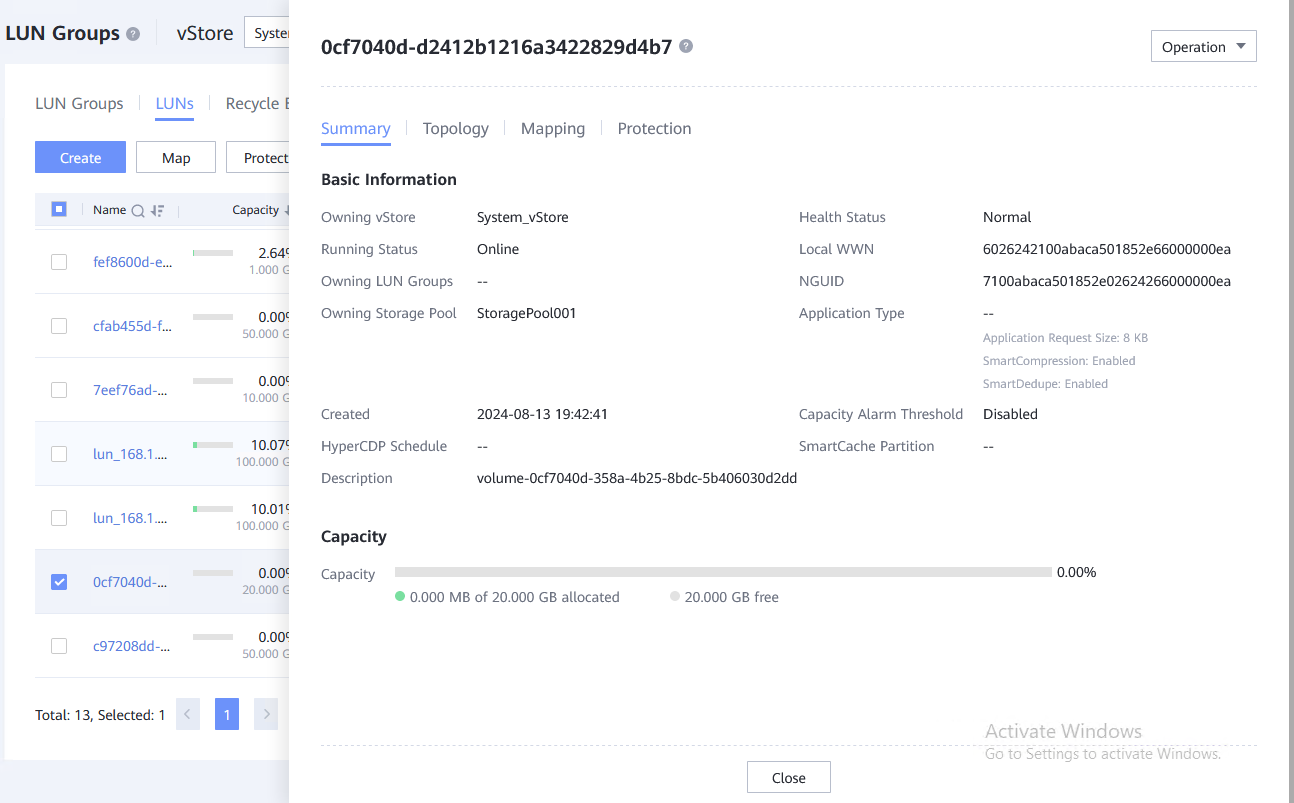
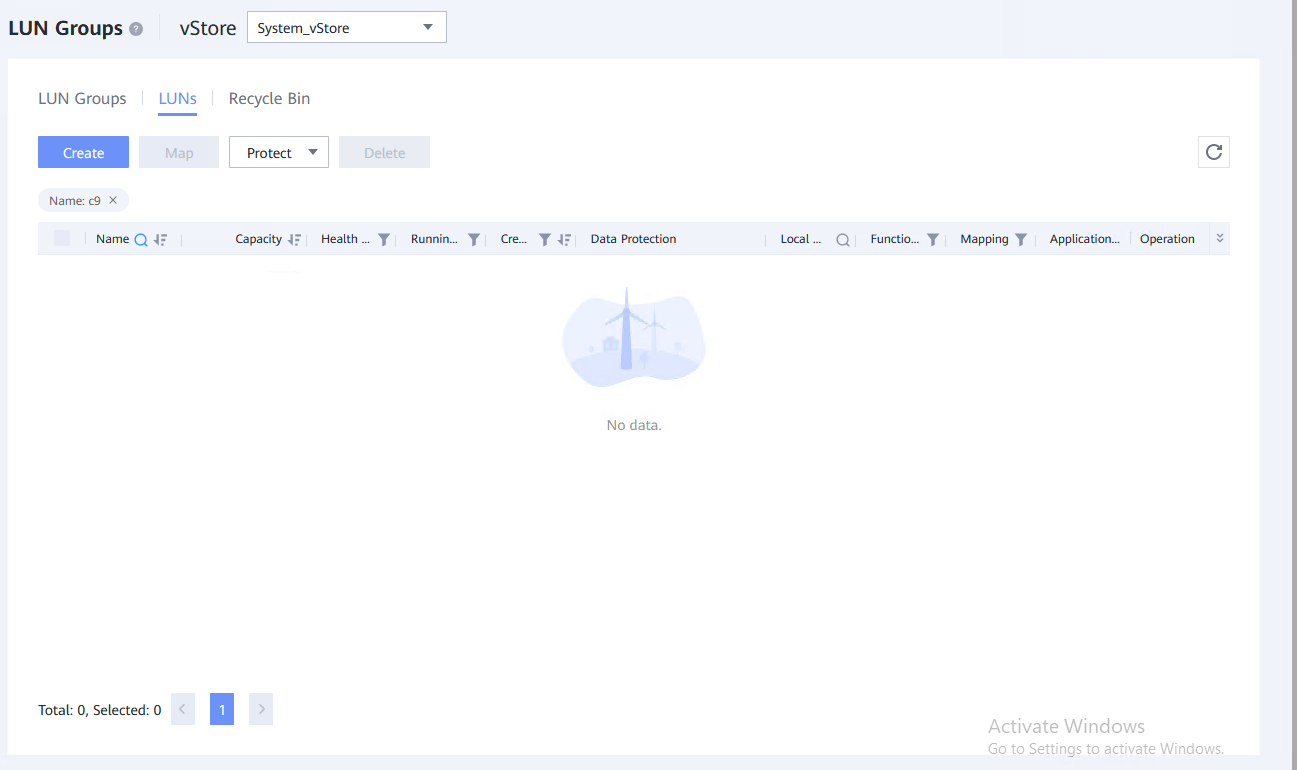

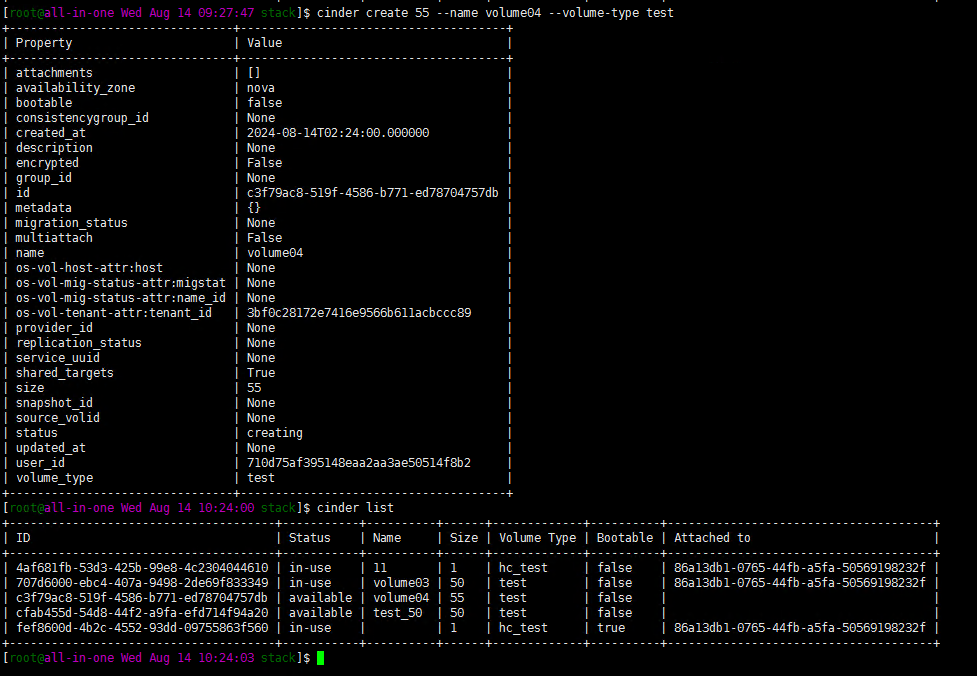

 6.
6. 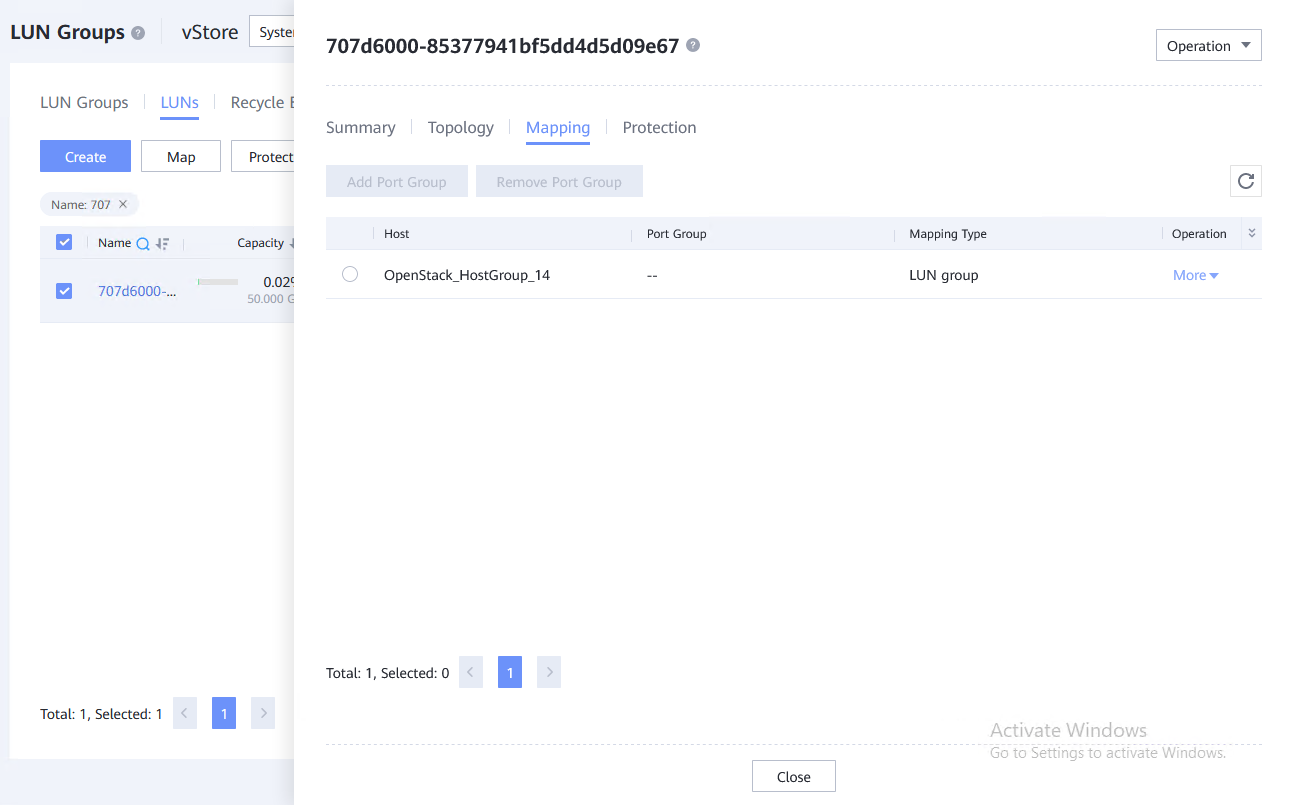
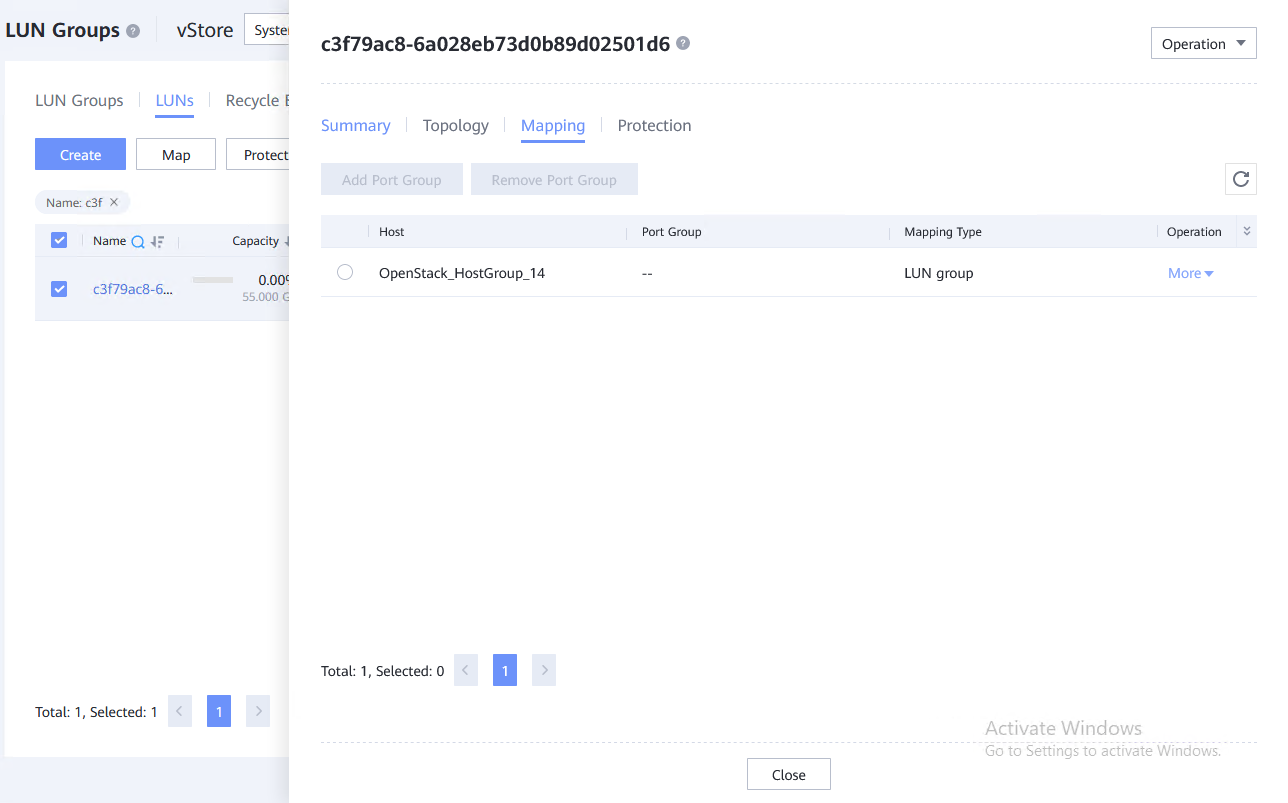

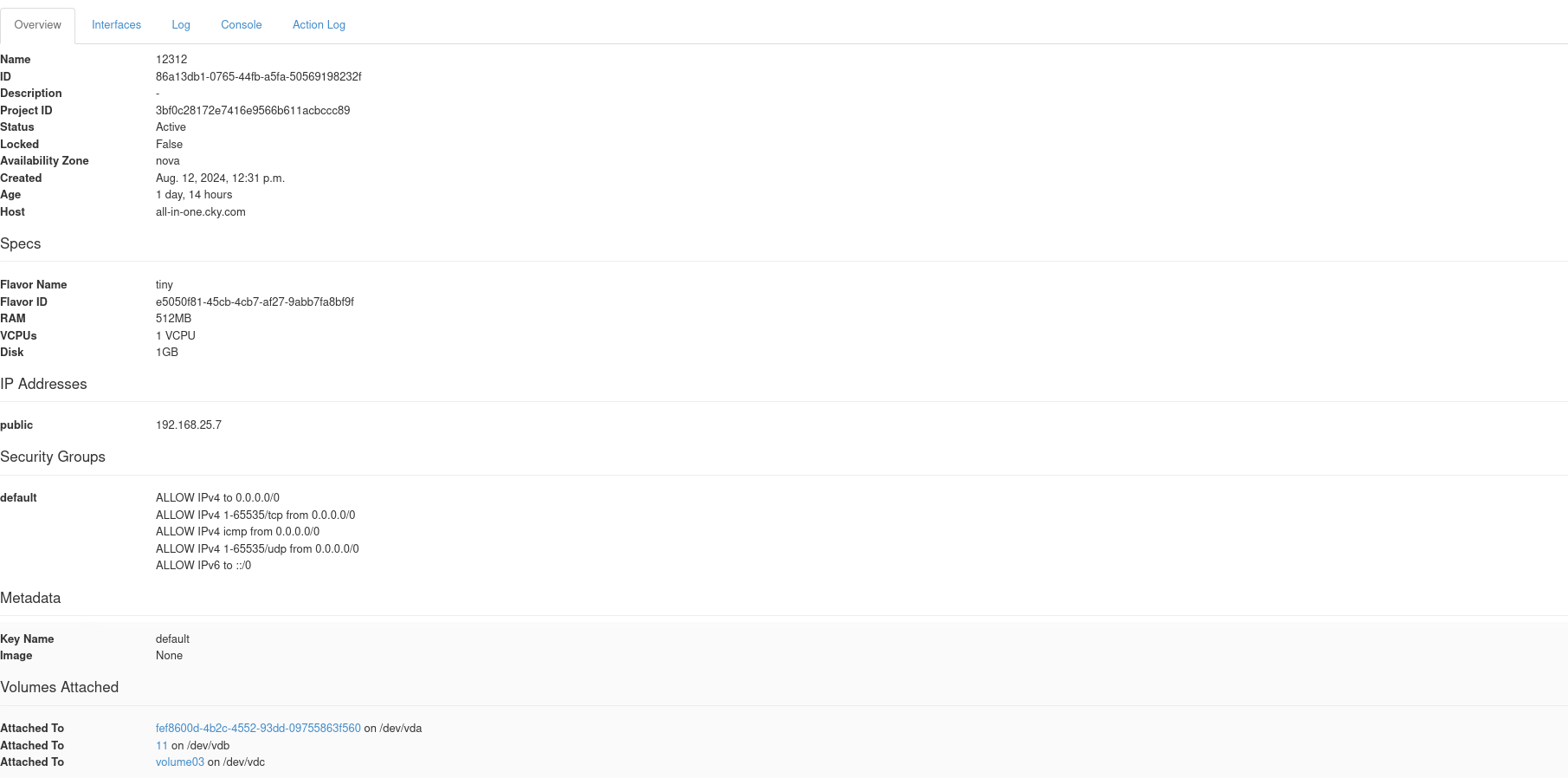 2.
2.  3.
3.  4.
4. 




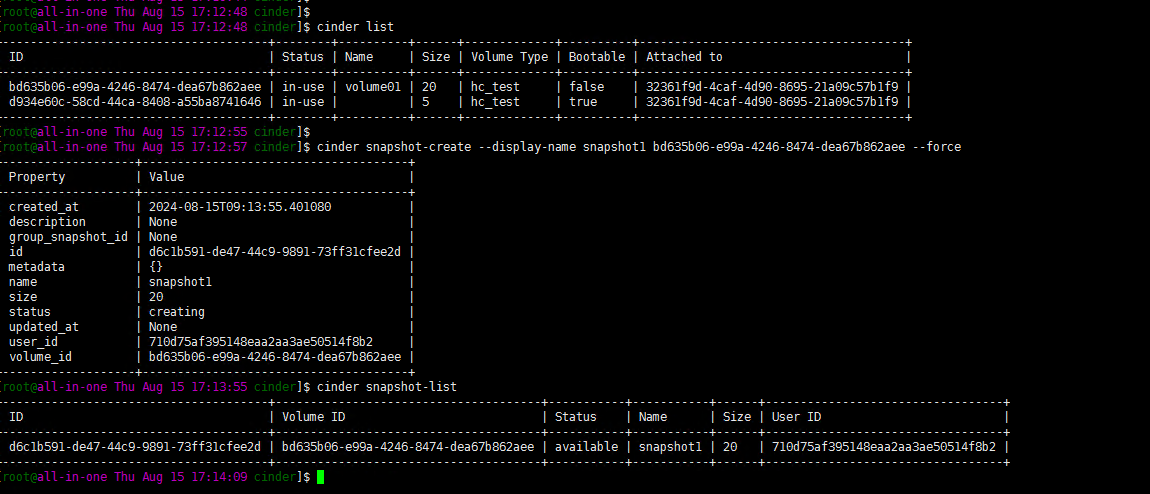
 2.
2. 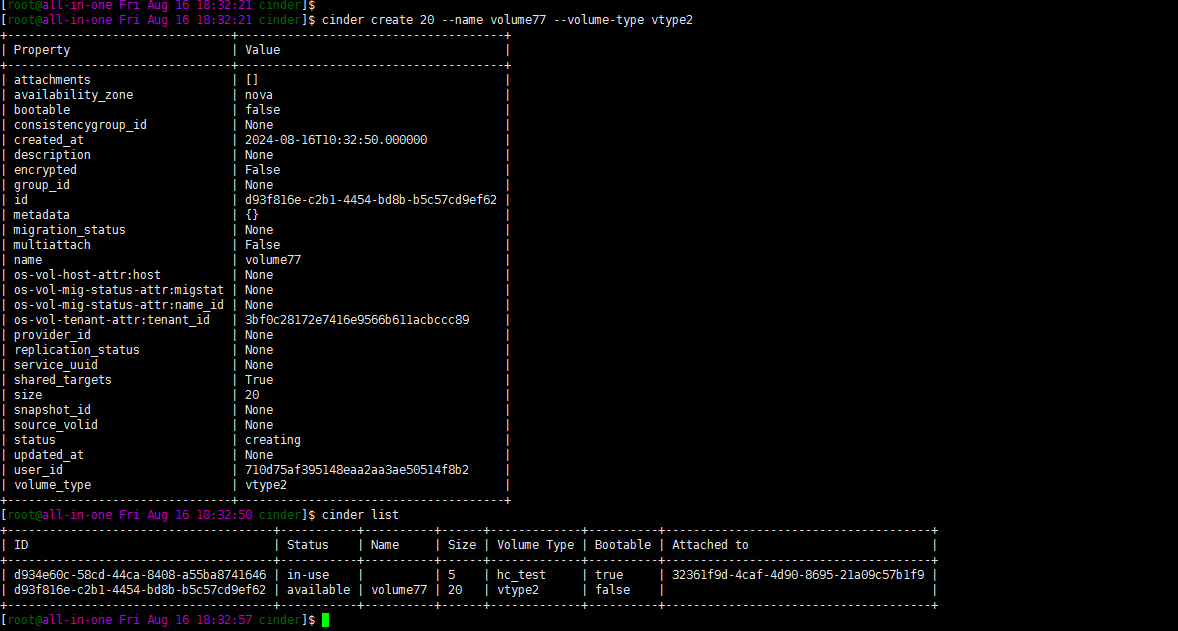
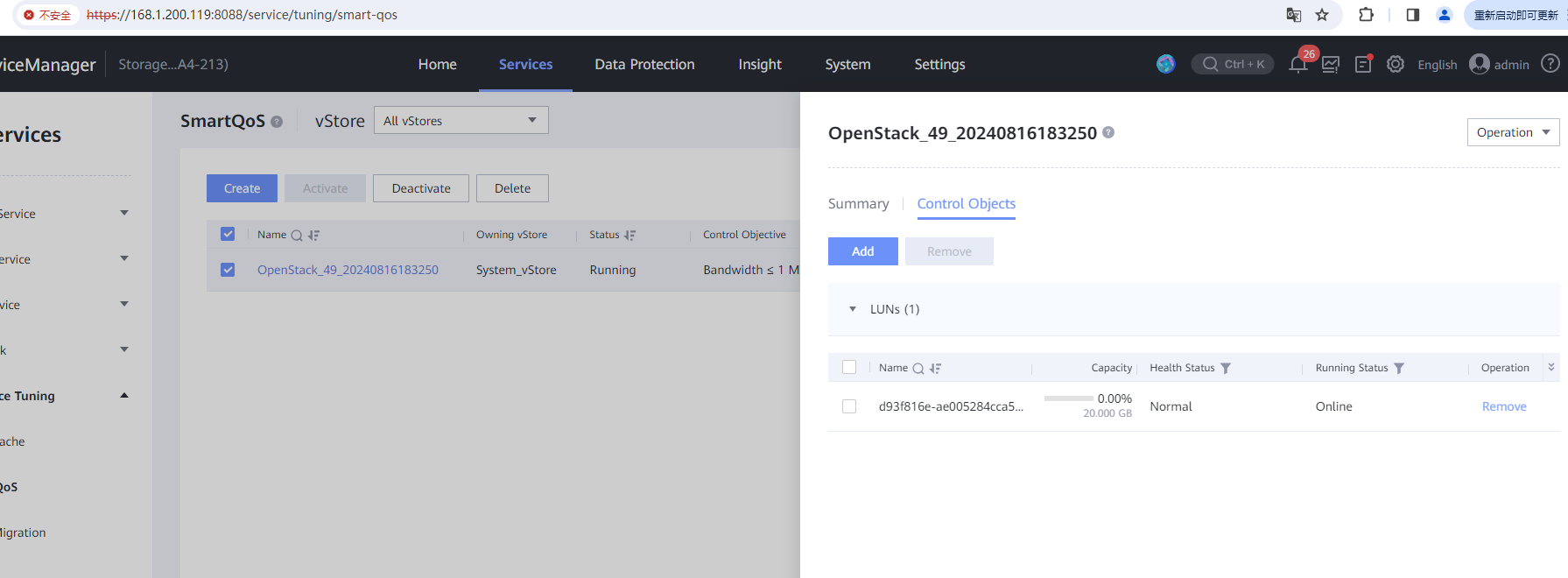
 2.
2. 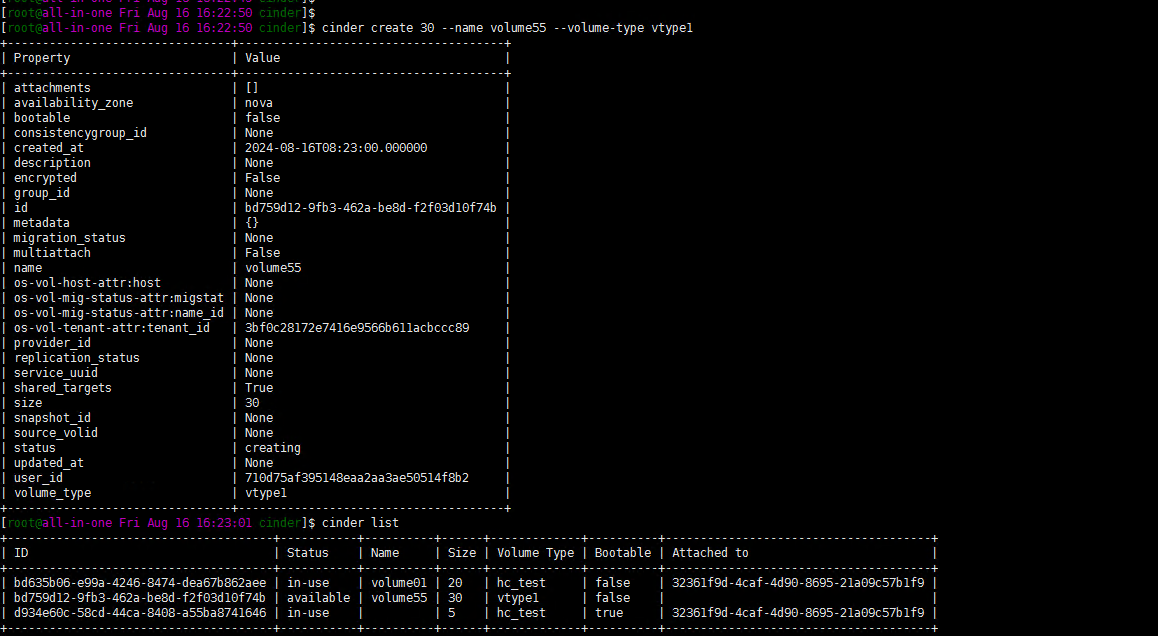
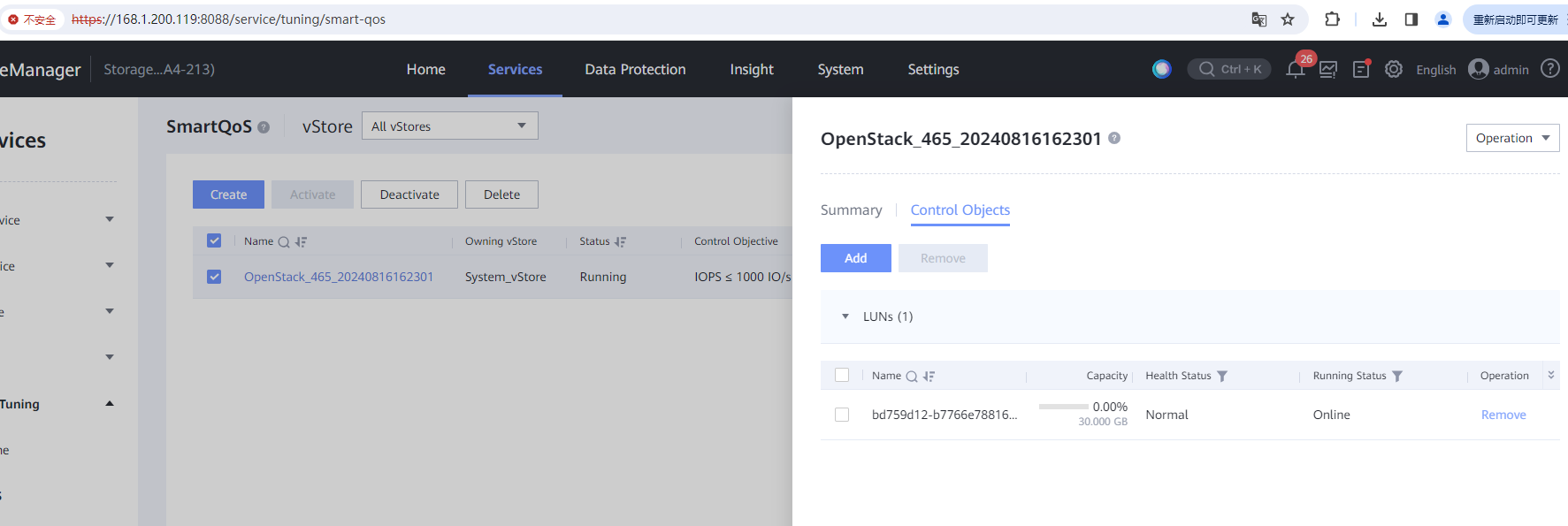



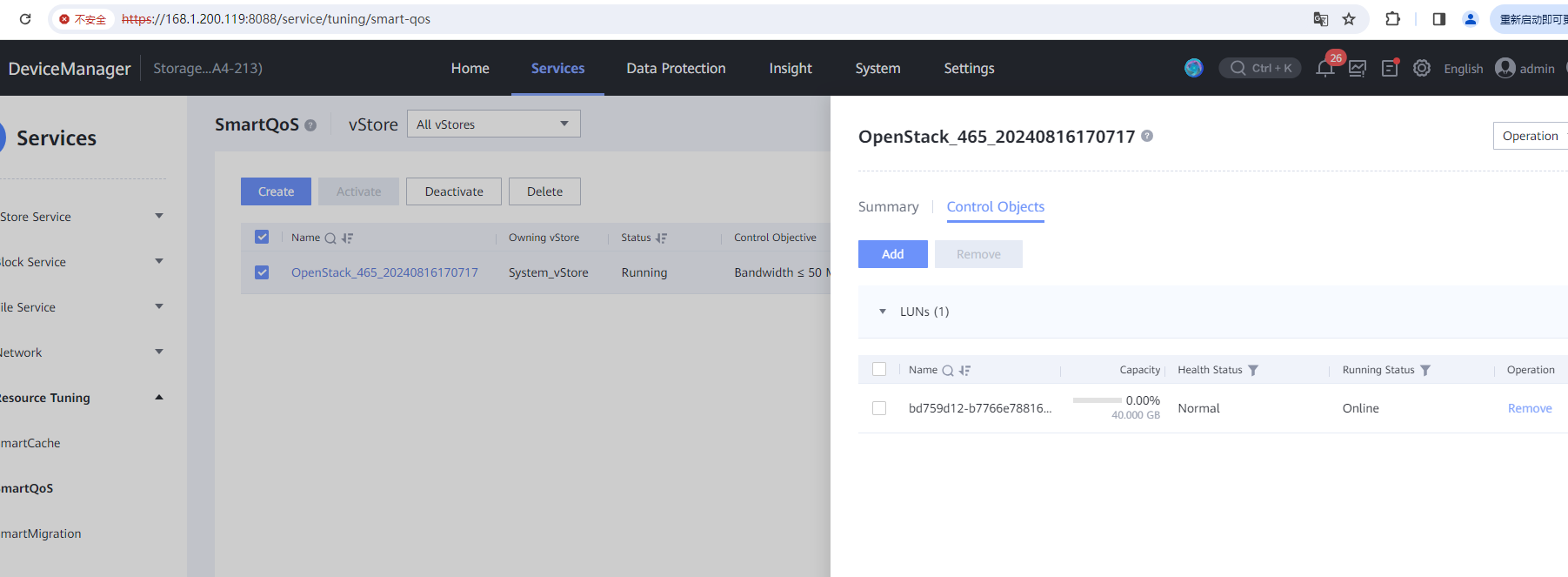
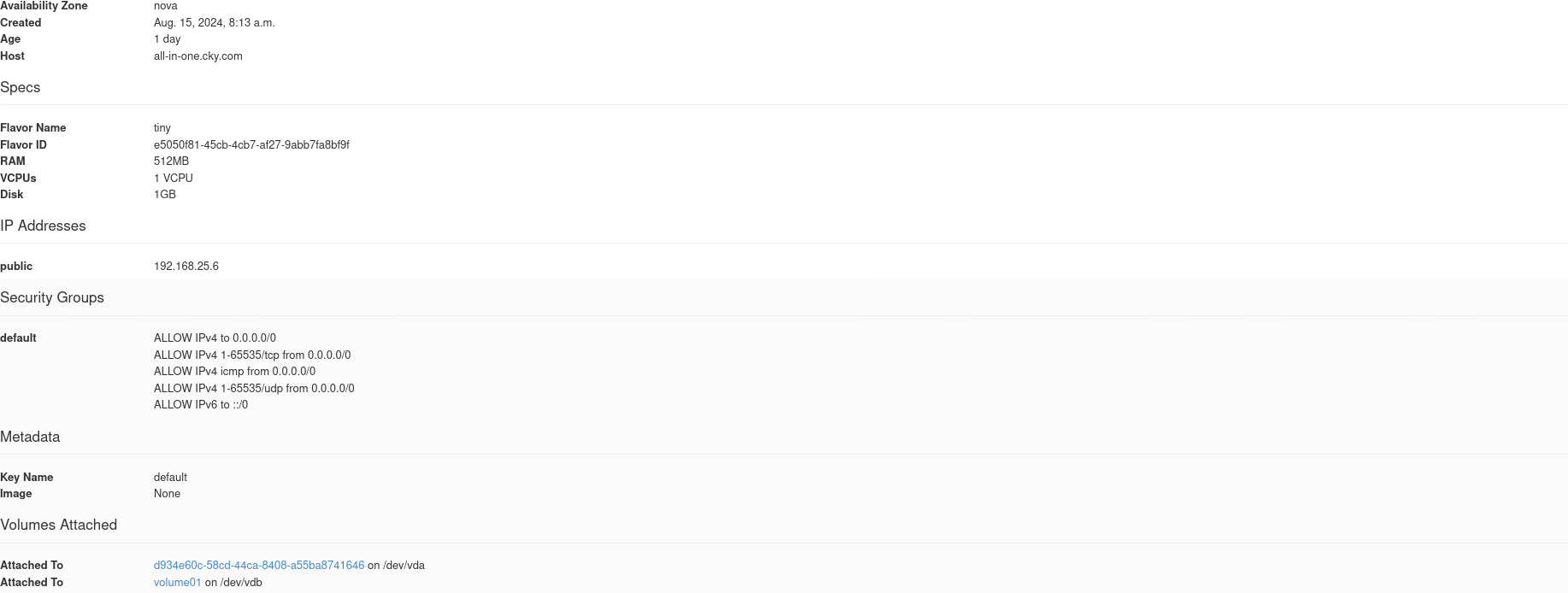
 2.
2. 






